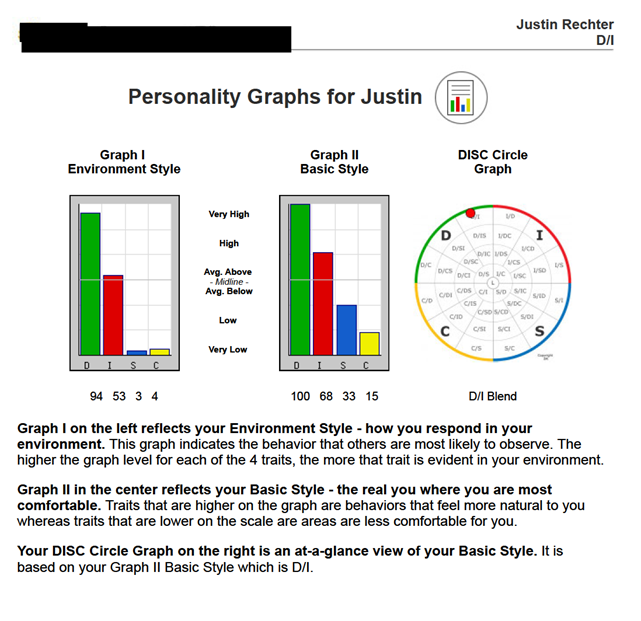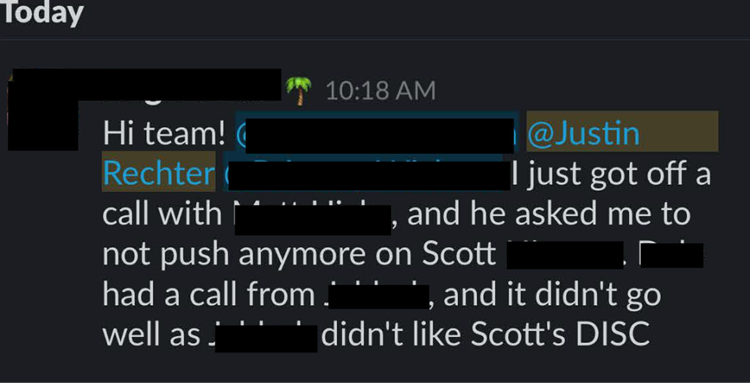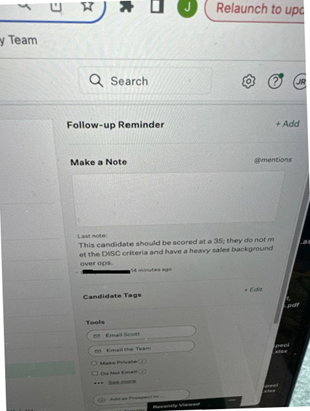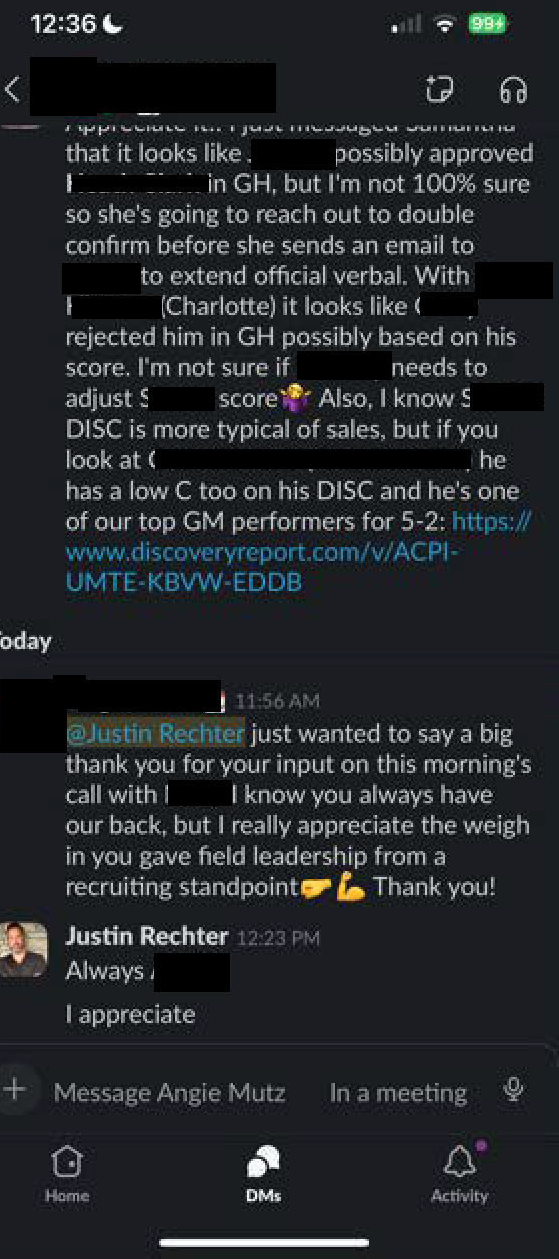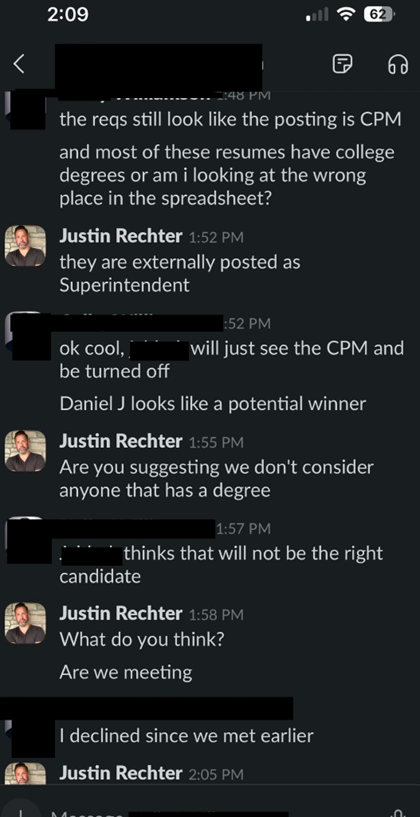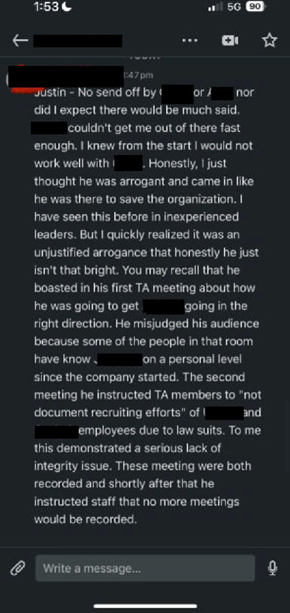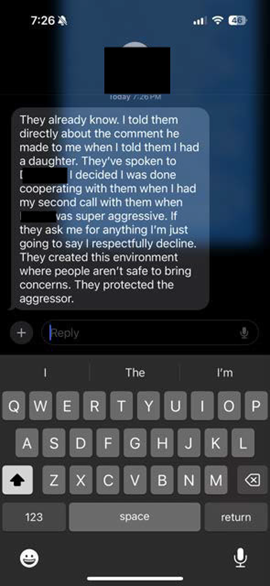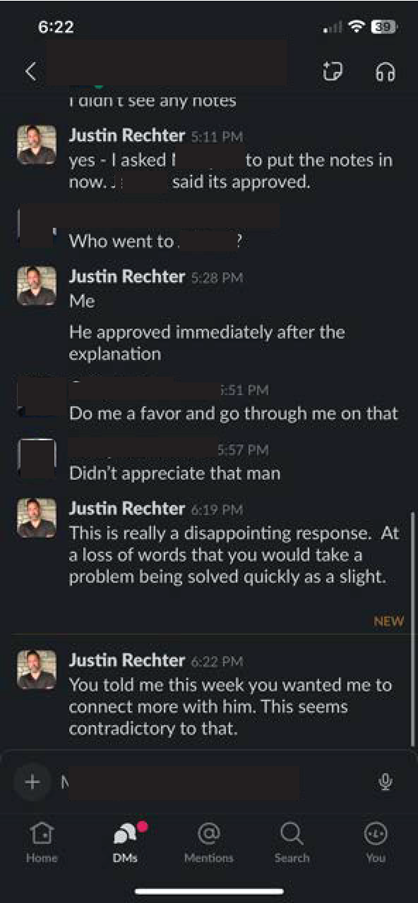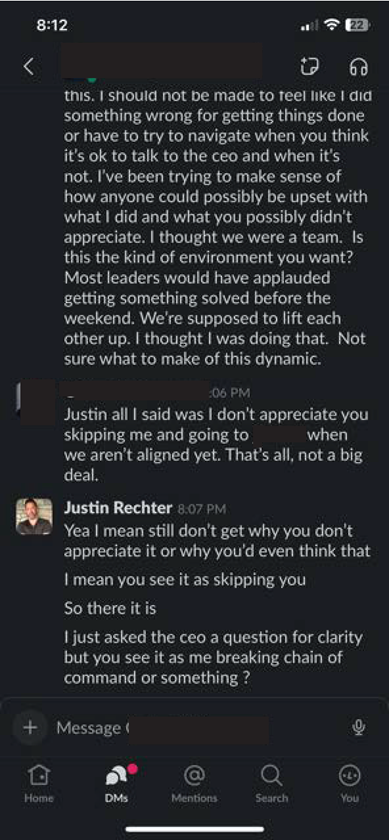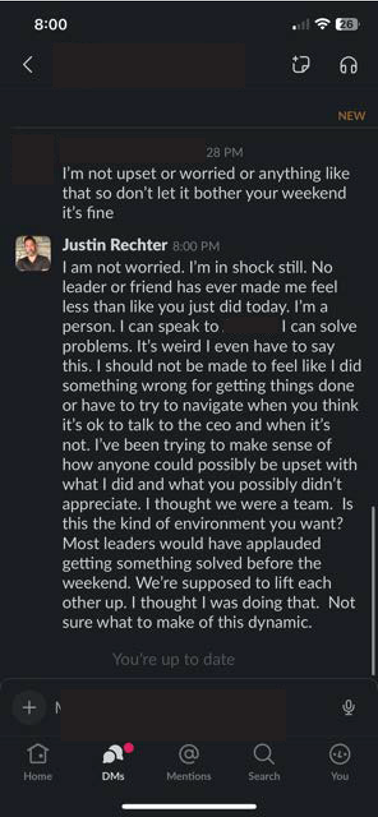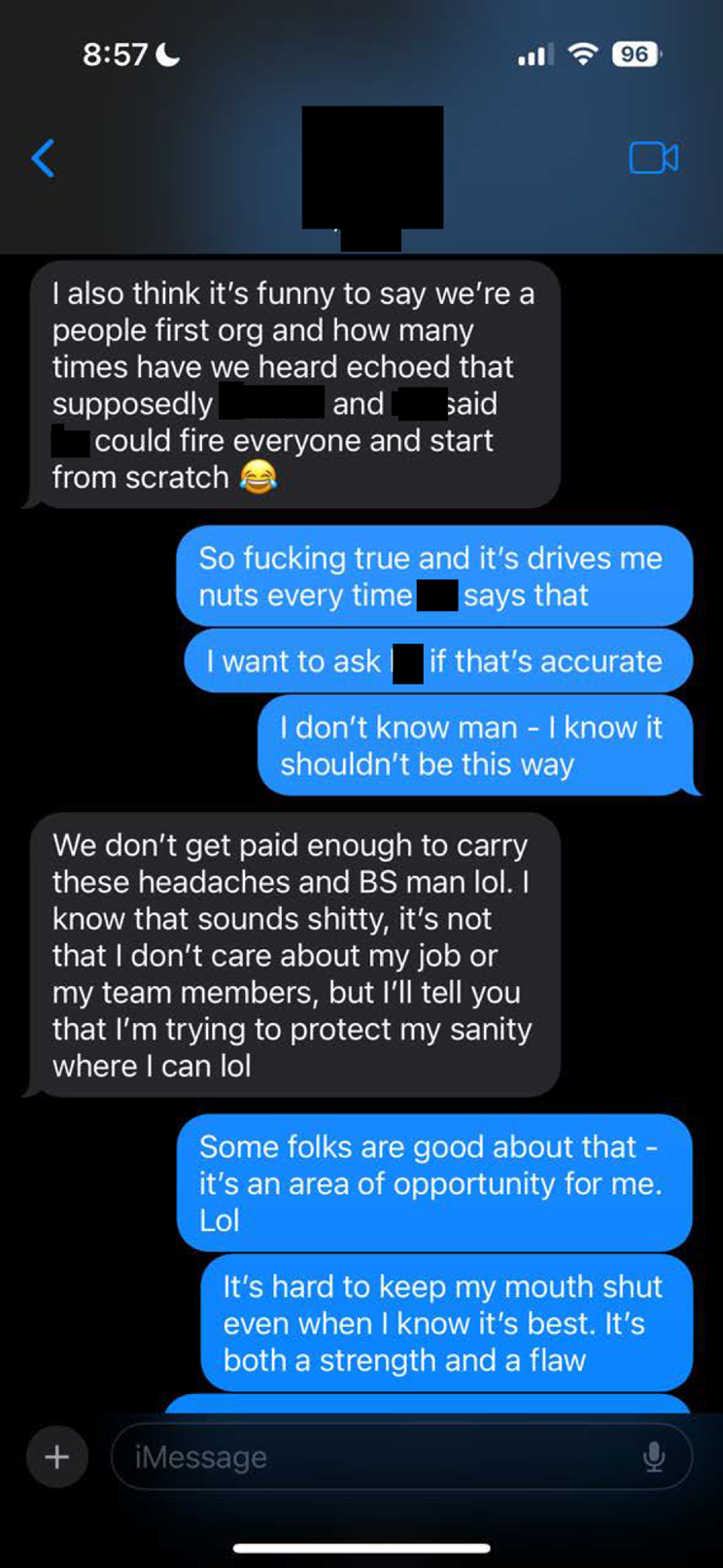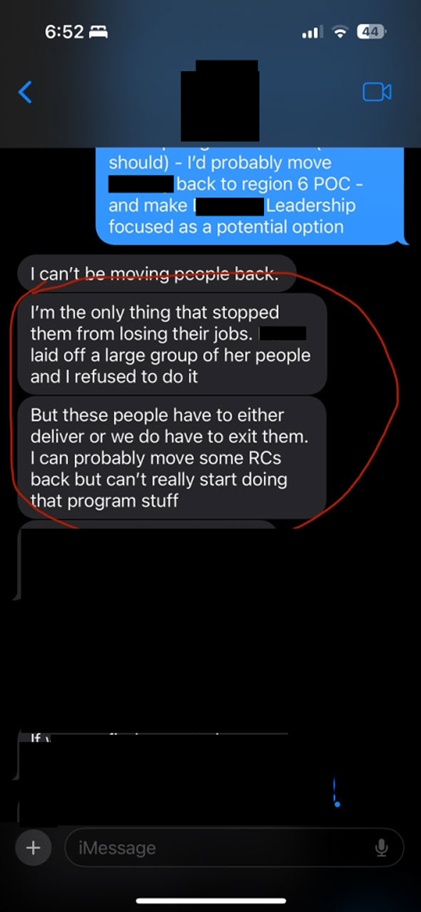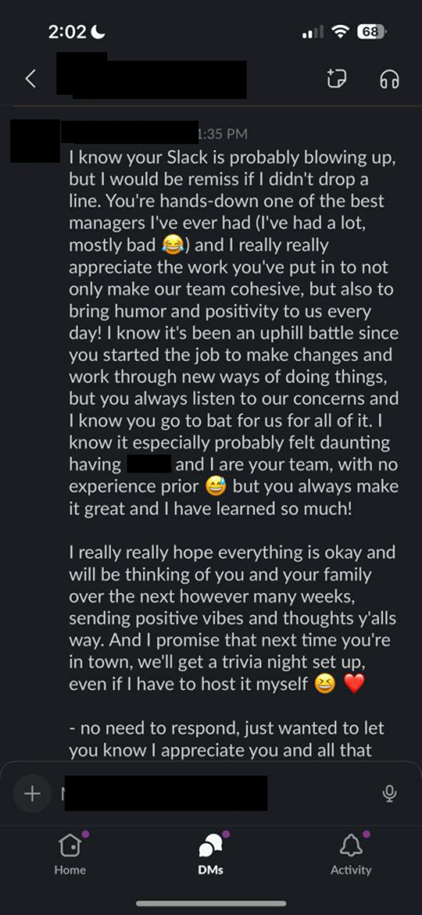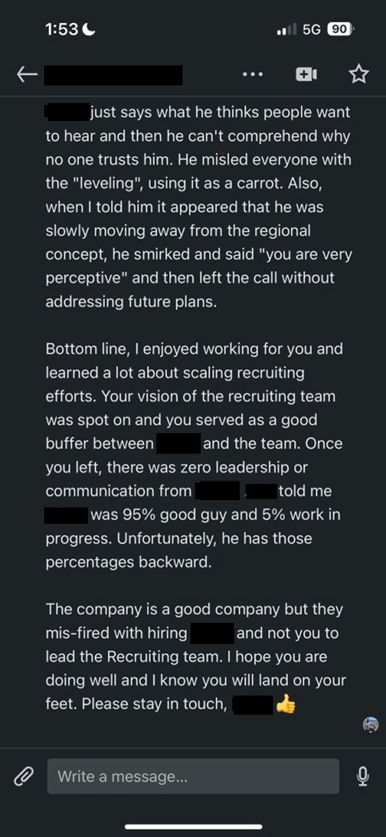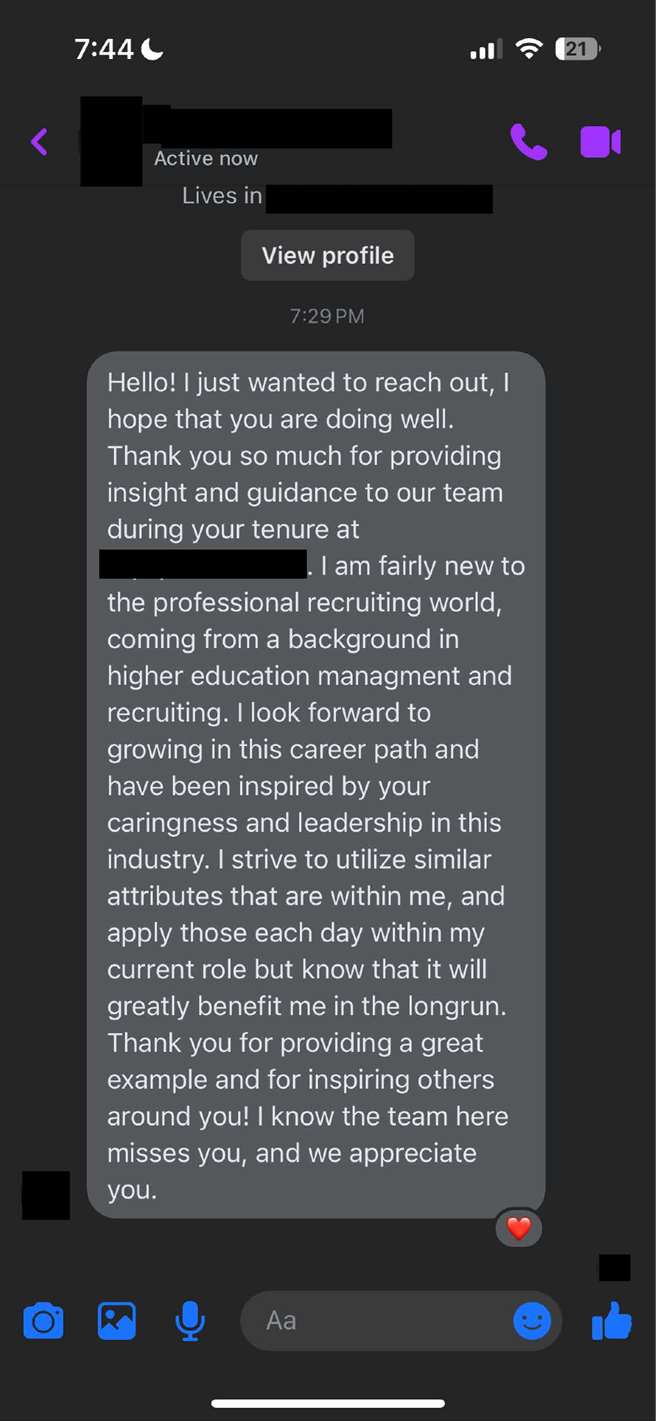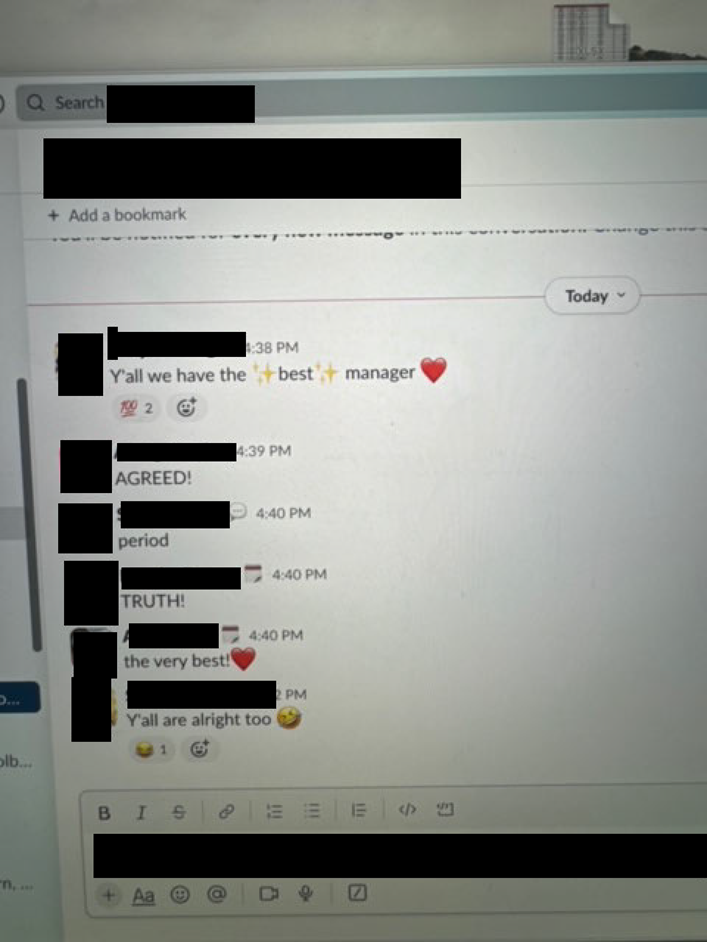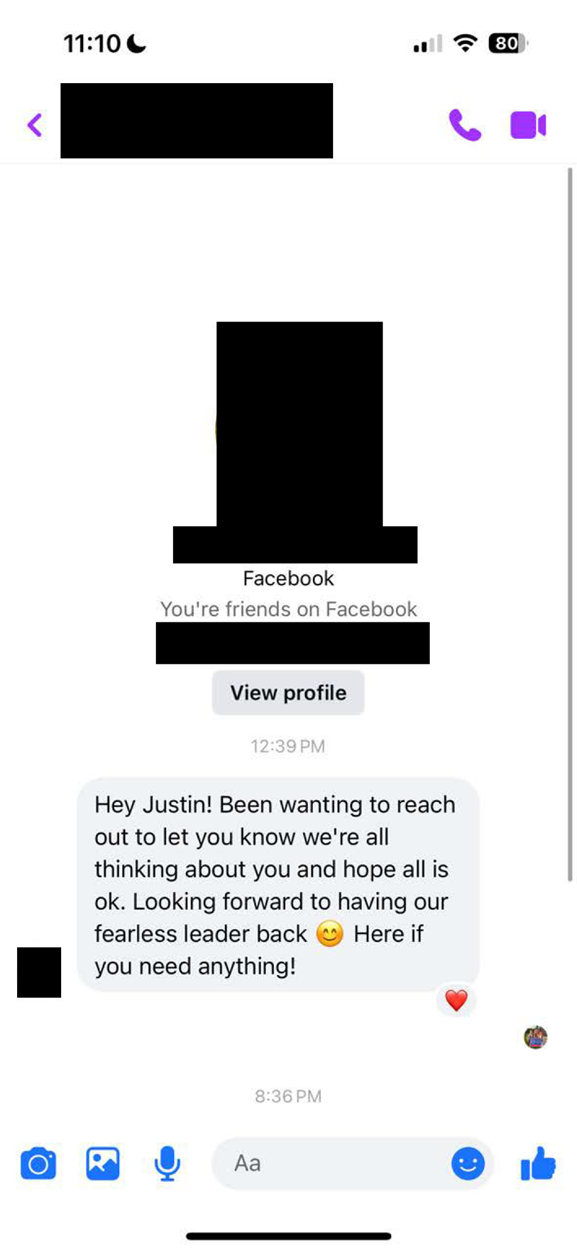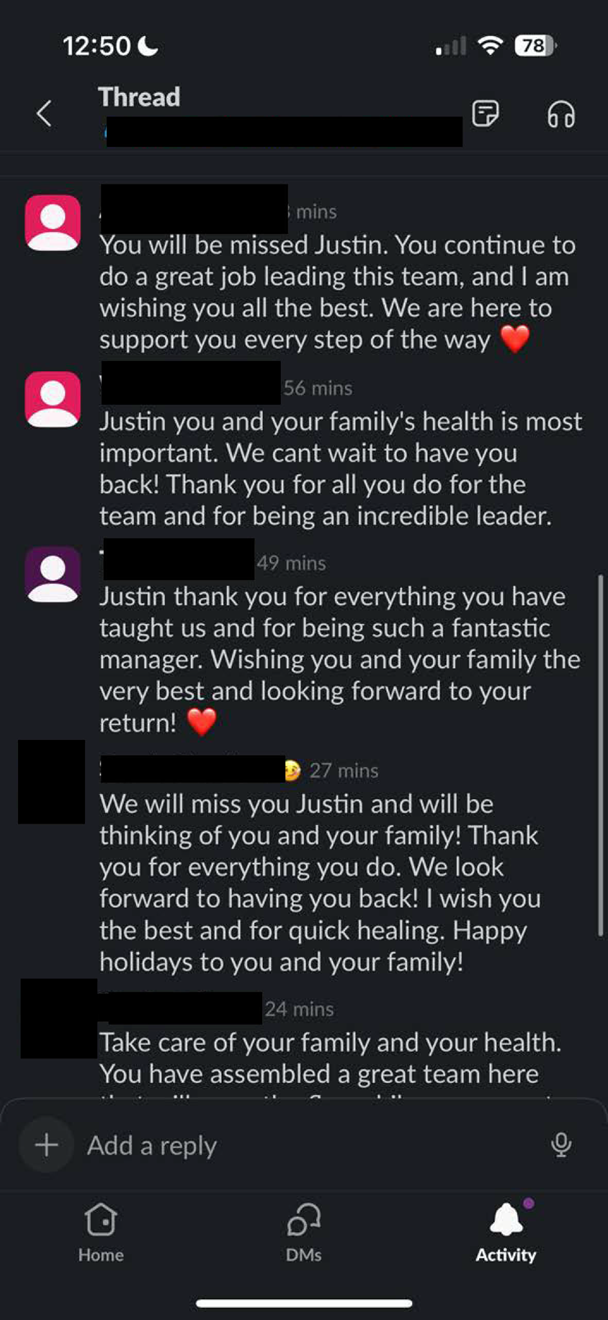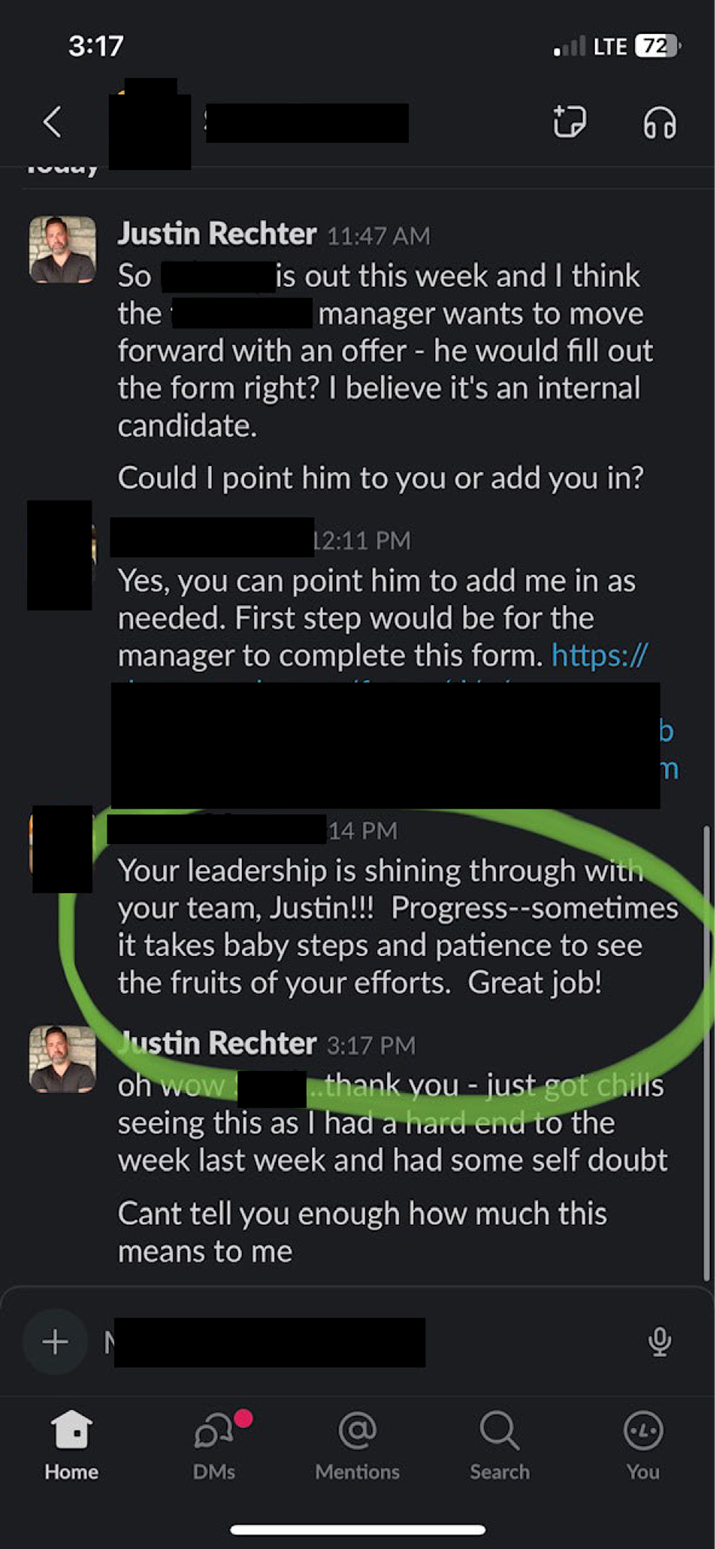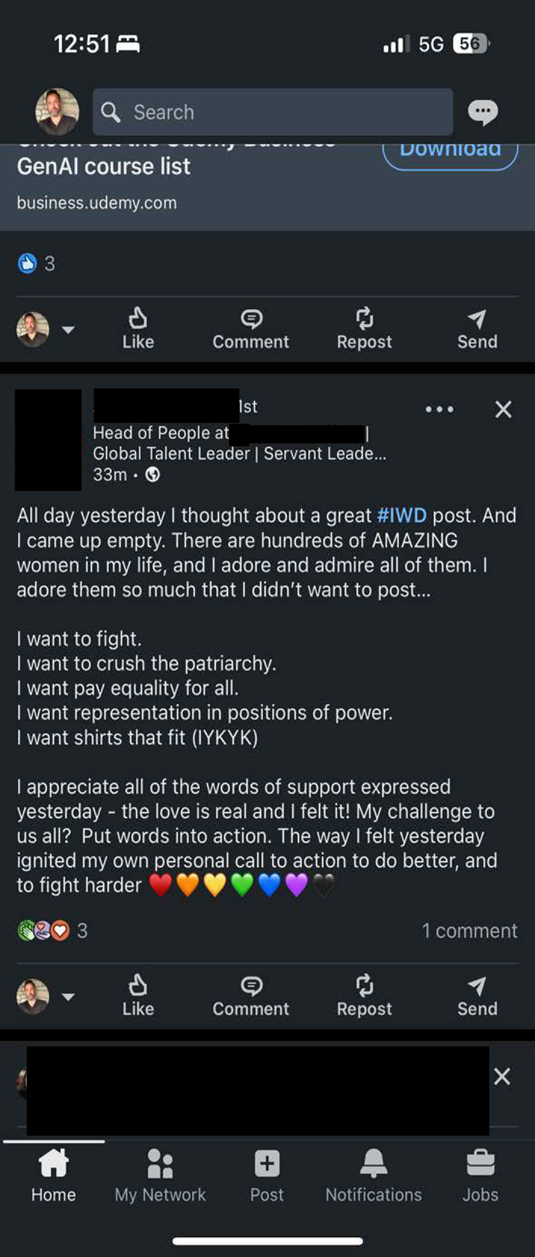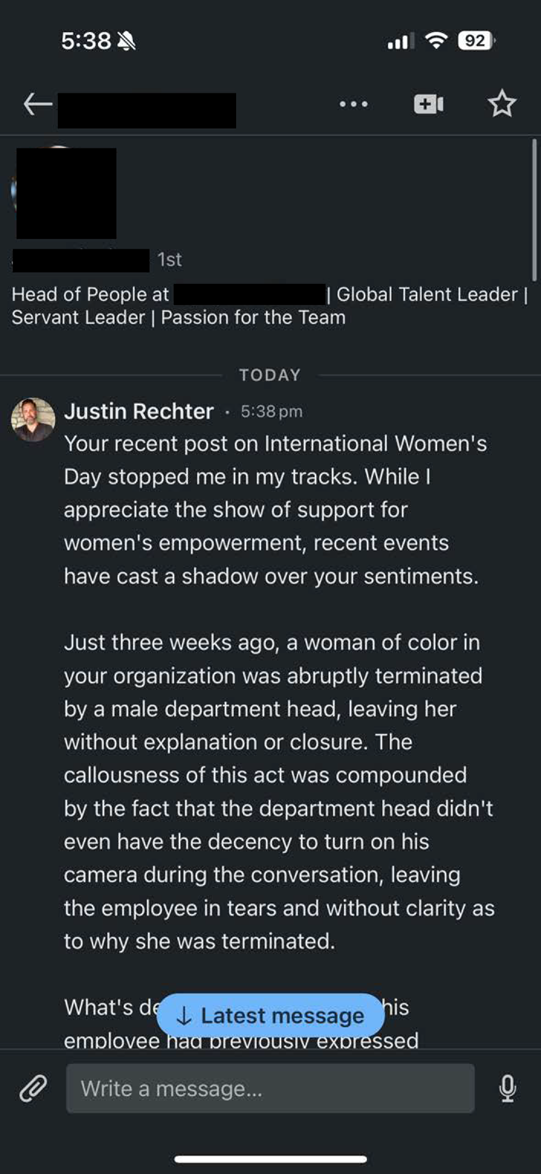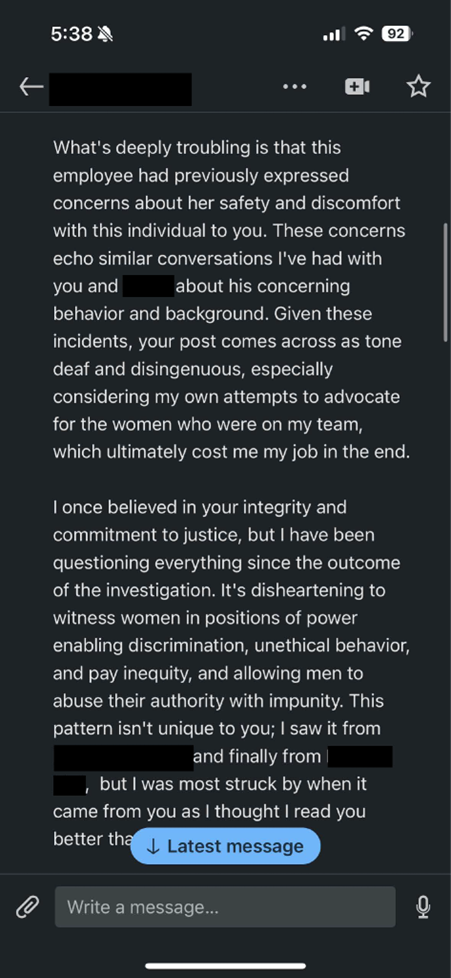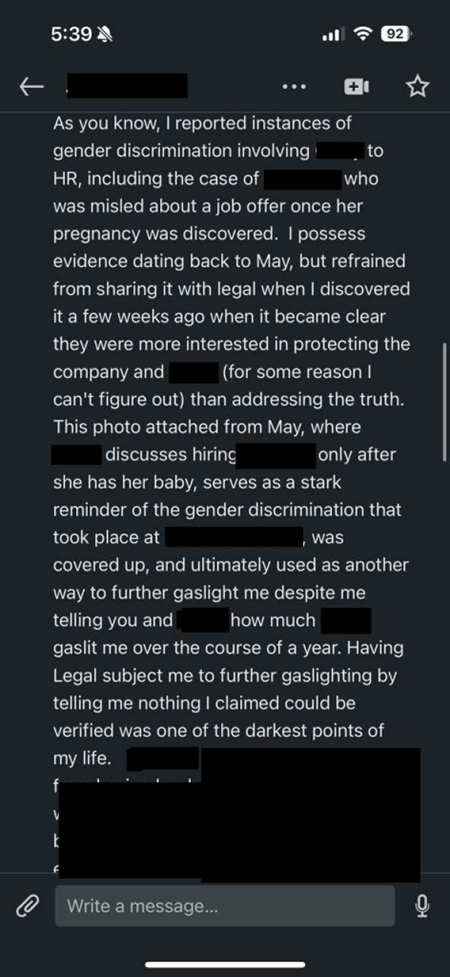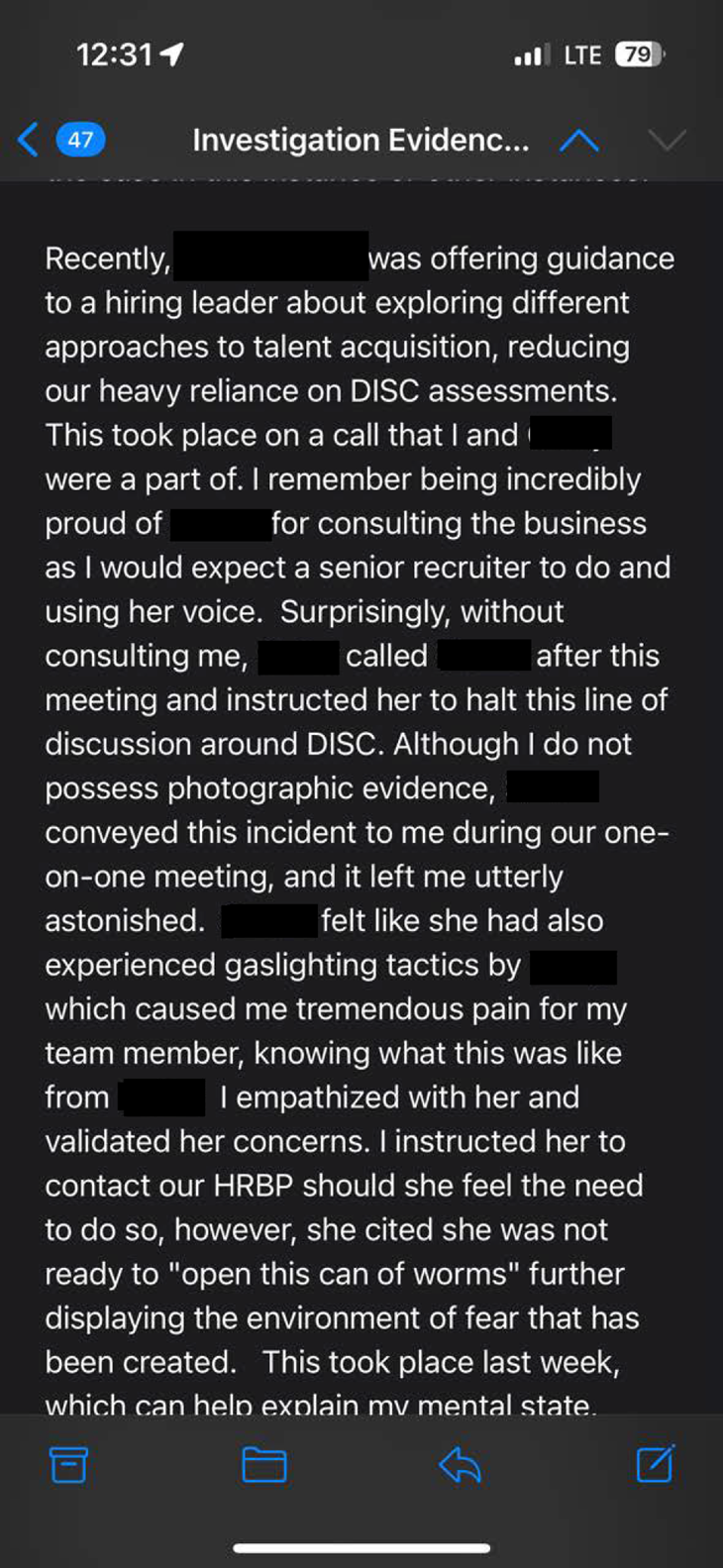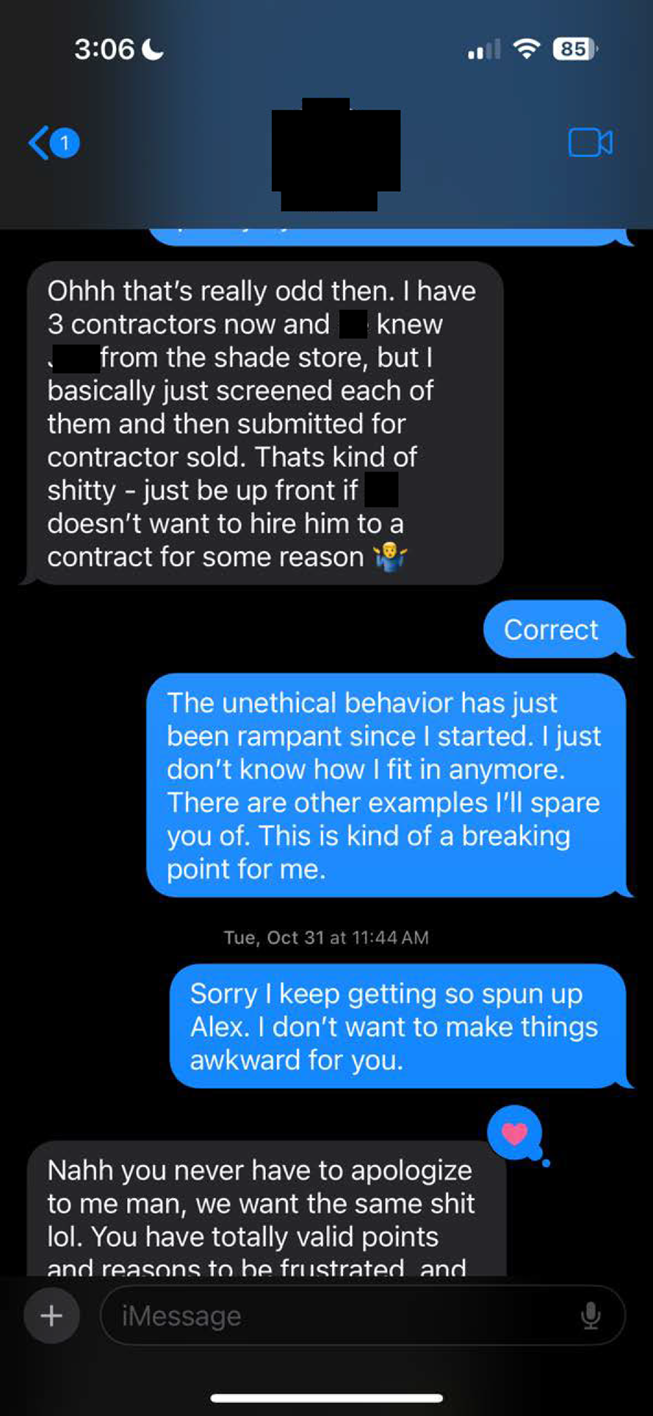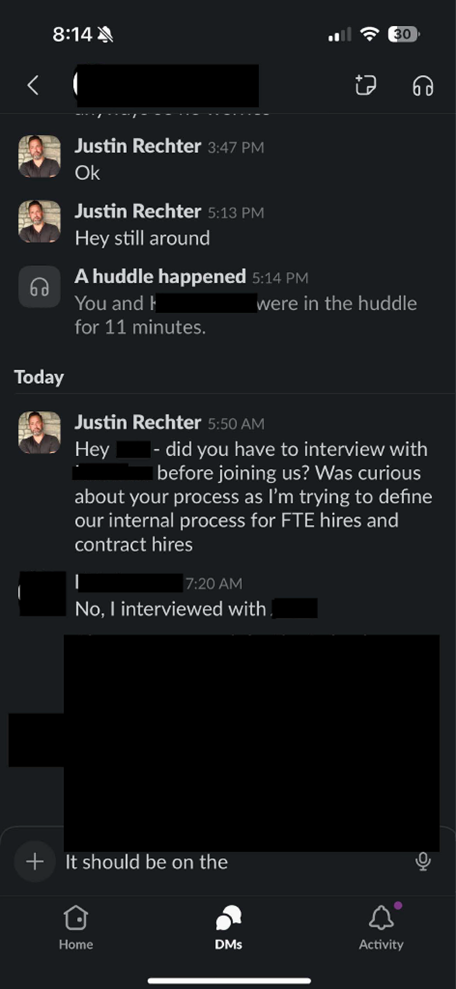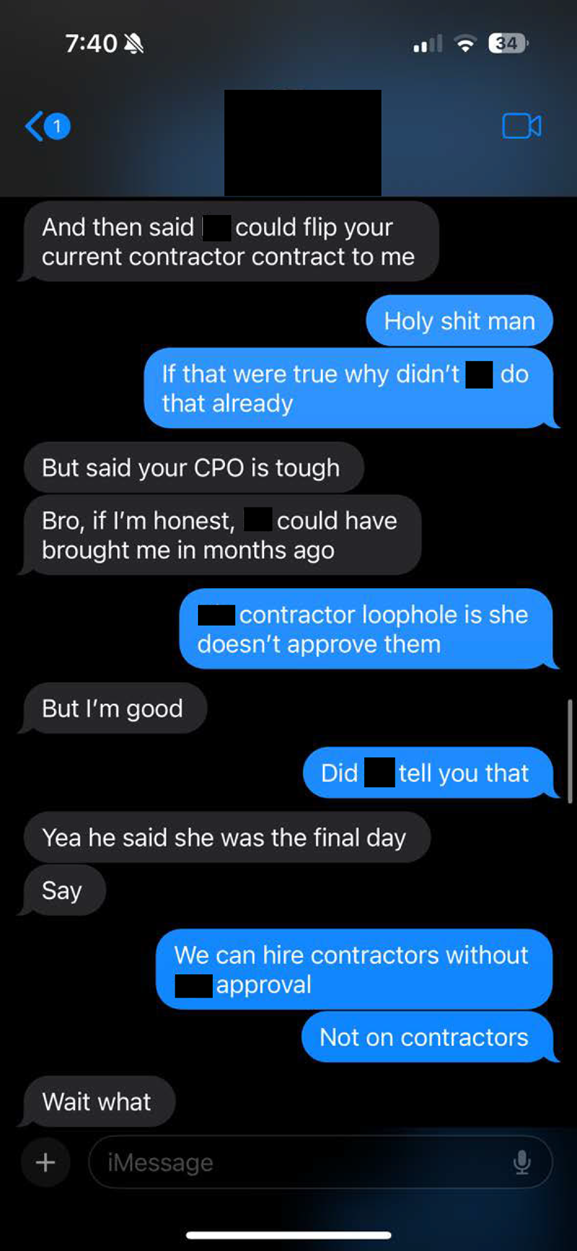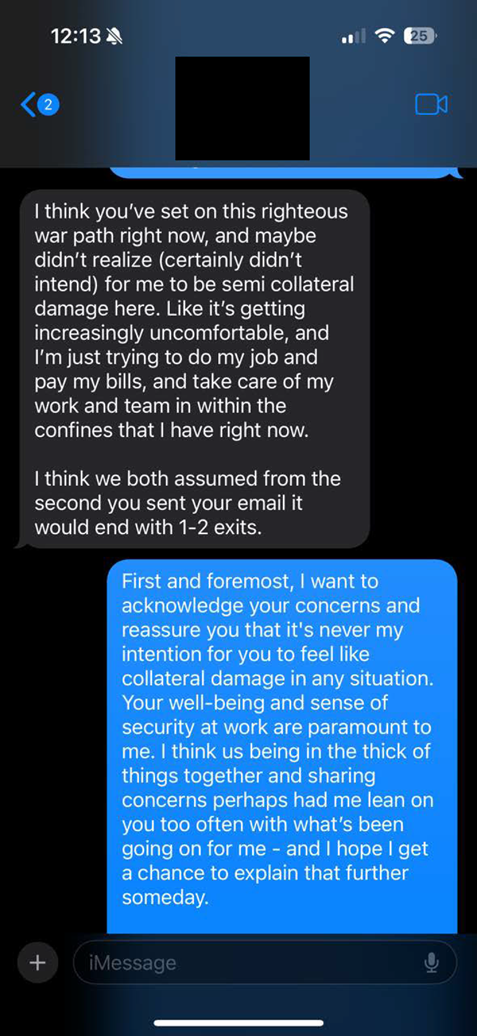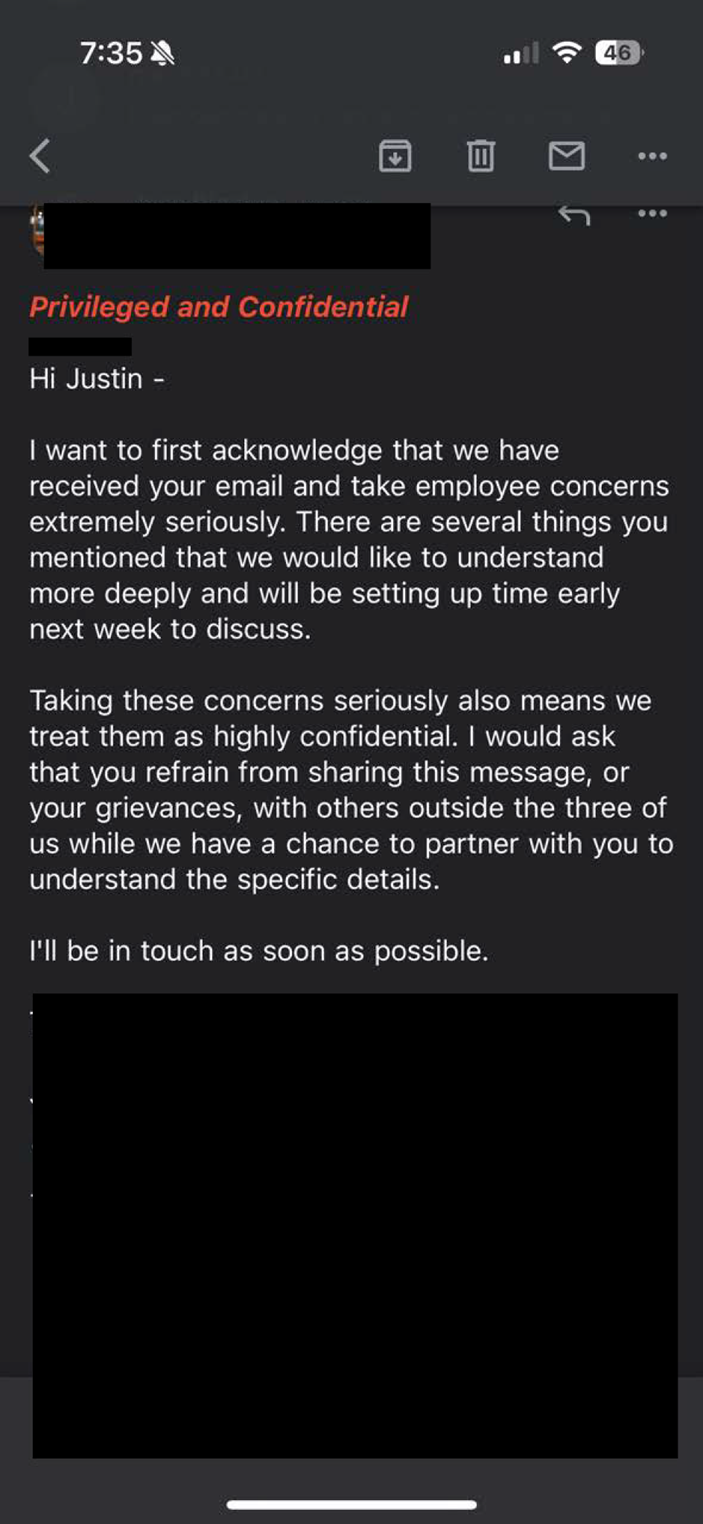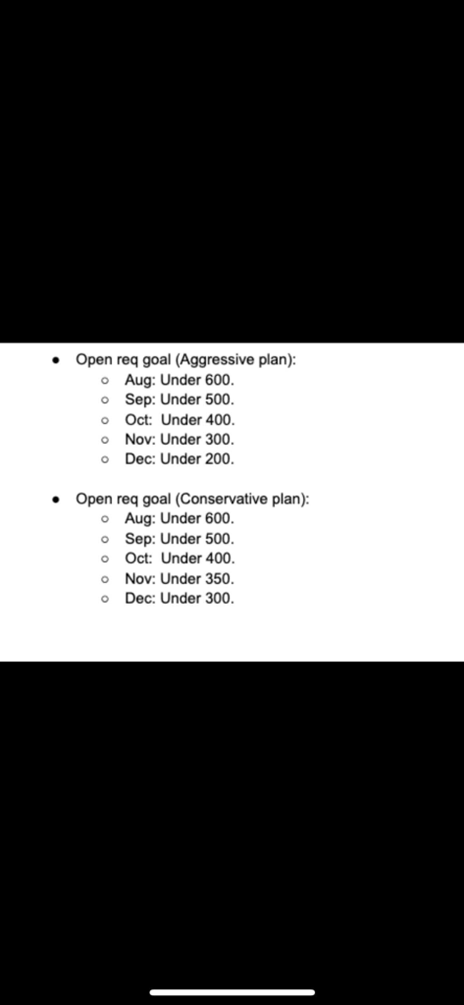Recently, I was made aware of a post from a lawyer who took part in a workplace investigation that not only derailed my life and career, but also gave my worldview a sharp, bitter twist. In their post, they can be seen giving themselves a standing ovation for having so-called “integrity, fairness, and transparency” in workplace investigations. This company, and many of its executive leadership, love to use these words when it suits their agenda. When it comes time to actually live by them, they suddenly become optional. But as Inigo Montoya would say, “I do not think those words mean what you think they mean.”
What I experienced was the opposite: a calculated effort to protect corporate interests, silence dissenters, and punish anyone who dared challenge unethical practices.
I guess it’s fun to play pretend, even as an adult, but when real people are harmed, it’s not a game—it’s cruelty dressed up as professionalism.
What I went through was a masterclass in corporate self-preservation. The post? A performance so dripping with hypocrisy it could win an award if they gave out awards for inauthenticity. It wasn’t about integrity or transparency—it was a finely-tuned act to shield the powerful while crushing anyone who dared speak the truth.
Truly, stomach-turning stuff for anyone who has a smidgeon of goodness in their body.
For over 17 years, I’ve worked in talent acquisition—leading teams, championing inclusivity, driving data-backed strategies, the works. And then I ended up at this lovely company represented by said lawyer. Instead of a workplace where ethics matter, I found myself smack in the middle of gender discrimination, insane inequitable pay gaps, hiring biases, favoritism, and unethical orders from my direct leader. You know, the stuff that is in practice, but is curiously missing from a company’s annual report. It was truly something out of the Twilight Zone where people would say “remember the one about that company that pretended to care about certain values, but ended up being more like a cult?”
My late mother, a state employee and social worker for over 30 years, drilled into me the importance of standing up for others, especially those who can’t stand up for themselves. So, sitting back and watching these injustices unfold? Yeah, not an option. (Thanks, Mom)
My moral compass didn’t exactly make me the office favorite. My direct leader, a master of gaslighting, routinely fed me lies about everything and anything – telling me higher-ups were unhappy with my performance (except when I asked them directly, suddenly, they had no clue what I was talking about). I was accused of “trying to steal their job” on multiple occasions and subjected to manipulative tactics straight out of the narcissist’s playbook. Gaslighting? Check. Love-bombing? Oh, you bet. Throwing people under the bus? Constantly. Grandiose sense of self? Playing the victim? Check and Check. And this barely scratches the surface of the circus I endured under their “leadership.”
Let’s talk about emotional manipulation. Being asked to lie, falsify data, and compromise my ethics on a daily basis was beyond exhausting—it was abusive. The kicker? When I finally said “enough,” I became the enemy. Leadership, the very people supposedly upholding the company’s “values” (ha!), retaliated. They twisted facts, launched a sham investigation, and effectively booted me for daring to expose the rot and complete ineptitude of this department head.
I went from getting congratulatory pats on the back from the CEO, CPO, and other execs to being Public Enemy #1 – all because I refused to ignore my leader’s blatant incompetence and misconduct.
Then came the grand finale: the company’s legal team (a.k.a. the corporate cleanup crew) swooped in with their dog and pony show investigation, dismissing my concerns despite all the evidence of unethical practices staring them in the face. I was such a fool to believe that HR and Legal would do the right thing. My experience revealed the grim truth: corporate culture protects its bad actors while throwing those who dare to challenge the status quo, to the wolves.
After eight agonizing weeks of a forced leave, I was fired without severance. Seeking legal advice? Not so fun. Apparently, my case would only cover “lost wages.” Emotional trauma? Suicidal thoughts? Health issues? Damaged reputation? Betrayal by people I once considered friends? None of that matters in a court of employment law. A charge of retaliation with the EEOC was filed and after months of legal fees and back and forth, I was advised by my lawyer and family to settle—because my mental health had taken such a nosedive—and now I’m stuck with an NDA I deeply regret signing. Naturally – a big chunk of the settlement went straight to my lawyer.
NDAs exist to control the narrative, to silence people like me, while those responsible for the abuse skip off into the sunset and post things like this image on LinkedIn without any recourse, with their reputations intact. The irony here? They can damage my reputation and that was not taken into account during settlement discussions, but I’m the one legally obligated to protect theirs? I’m the one that has to now protect my abusers? Make it make sense. I’m done dancing that dance – so I will tip toe the line here.
So here I am—forced to pick up the pieces of my life, while these people, including our star of the LinkedIn post, keep flaunting their so-called ethics and integrity. And until employment laws change, companies will continue to use them to cover up misconduct while leaving the people they’ve harmed voiceless and forever damaged. Make no mistake – I am forever damaged. I was officially diagnosed with PTSD from this experience. (Also – not included in settlement negotiations as a fun parting gift!)
To anyone else silenced by NDAs or crushed by retaliation—don’t stop speaking out. We can and must demand real change. I’m more committed than ever to pushing for reforms like the Workplace Psychological Safety Act, which would finally hold these abusers accountable.
So to the lawyer who posted this charade about “integrity,” I have one thing to say: Thanks for the inspiration to finally share more of my story. I won’t name names, but feel free to connect some dots on your end.
You can hear more about my story on this podcast. At the time of recording, I was still in the middle of this so-called “investigation,” holding on to some hope that the company would eventually do the right thing. I hadn’t yet experienced the full extent of the legal team’s shady tactics.
Now, to the other lawyer that was a part of this dynamic duo – a lawyer who reminds me of the one in “Jurassic Park” that gets eaten by the T-Rex—you know, the guy nobody felt bad for, even while he was being devoured. After hearing about my podcast, you called my recording “outrageous” and even threatened to sue me, sending a message to my lawyer.
Here’s my message to you: It’s only “outrageous” because it exposes the truth. If “protecting the company” means abusing people in the process, then how different are you from all the other oppressors throughout history who claimed, “I was just following orders”? No one held a gun to your head and forced you to try to harm me and my family. You chose to act this way, and no amount of legal threats will hide that. Maybe it’s time to look in the mirror and realize you’re the villain in this story. I’ve got nothing to hide—can you say the same?
And then you claimed that you thought the matter was “resolved”? Of course you would—because in your world, abusing someone for months and then forcing them into silence probably *does* feel like resolution. But suddenly, now you want to play by the rules and use logic and reason? After months of doing anything but that? You’re the guy that gets eaten that nobody feels bad for. Remember that.
Much like now, I never mentioned the company’s name on the show, nor the name of the fraudulent leader running the TA department. My lawyer pointed that out, and surprise—haven’t heard from you since.
This is just another example of how far toxic companies will go to cover their tracks. They don’t care about fairness or truth—they care about keeping their dirty secrets buried.
Now, let’s dive into your so-called “findings,” shall we? This is going to be fun.
And remember kids – screenshots don’t lie – but shady unethical lawyers and companies do!

The first bullet above is loaded with intentional falsehoods and blatant misdirection. Who exactly was interviewed? Because I never claimed anyone was directly threatened. What I said was that the team feared for their jobs if they didn’t follow the biased directives. As you’ll see in the images throughout this website, my team openly discussed these biased directives—directives this lawyer conveniently brushed off as “unsubstantiated.” I shared dozens of images of biased directives with the legal team and my team’s reaction to them, but what they didn’t count on was that I was also blind-copied on emails sent to their own staff, echoing the exact concerns I raised about discriminatory practices. I wonder if those who were interviewed would recognize the version of their statements this company is now pushing?
The images I share will contain undeniable evidence of discriminatory and biased hiring directives, as well as unethical manipulation of documentation.
And let’s go back and address this laughable notion of a “fair and unbiased investigation.” While I was forced onto an eight-week leave of absence, with my computer and phone access cut off, the very Head of Talent Acquisition—ya know..the one under investigation—remained in their role, fully aware of the investigation sparked by me (thanks to the legal team confirming this when I asked them) and free to control the narrative and manipulate the outcome. Fair? Unbiased? There have been investigations in communist dictatorships that were more fair and unbiased than this one.
Now, let’s tackle bullet 2. This involves a candidate and someone I managed previously at my former company. I referred them to this company in May 2023 as indicated in the image below where she texted me on May 12th. She completed the interview process, and as you can clearly see in the documentation below, the Head of Talent Acquisition (TA) expressed a desire to hire her—”but only after her maternity leave.” This made me sick to my stomach. At the time, this candidate was unemployed, and although her due date wasn’t until July, her pregnancy should never have been part of the hiring decision. It shouldn’t have even been discussed! This is HR 101 stuff.
I confronted the Head of TA directly, raising both legal and ethical concerns. Why was her pregnancy part of the conversation at all? I was disturbed, but not surprised, when the candidate later confided in me that the Head of TA told her outright: the Chief People Officer didn’t want to hire someone who would “ramp up and then go out on leave.” Not only is that unethical—it’s blatantly illegal.
The Head of TA regularly used this tactic, conveniently shifting blame onto others—like in this case, pinning the discriminatory decision on the Chief People Officer. (I really hope the former CPO reads this, considering they were such close buddies, and the Head of TA was their first hire at the company due to their previous working relationship and friendship. Yet, when it came time to deflect blame, the department head had no problem throwing them under the bus.) Despite the clear evidence, this was dismissed as “unsubstantiated” by the so-called investigation.
I will add, the candidate was finally hired in July/August after giving birth, but the fact remains – the company withheld multiple months of benefits and compensation she should have been entitled to if they had followed the law and extended the offer when she was first deemed a fit for the role. This wasn’t just discrimination—it was deliberate, unethical treatment that could have been easily avoided.
At one point, the Head of TA tried to blame the decision on a so-called “lack of headcount,” the same excuse he fed to many other candidates—people I knew well—whom he had promised offers to, only to ghost them afterward. I was left to pick up the pieces, awkwardly explaining away his lies about headcount, which I begrudgingly did. (Sorry, Josh, Jorge, and Shelli). Of course, the reality became clear soon enough: in the weeks that followed, we hired multiple recruiters without hesitation. So much for that “lack of headcount” excuse.
I reported this event to HR that summer. Predictably, like every other report of misconduct, it was swept under the rug with no real follow-up.
Unsubstantiated though….
This 3rd bullet addresses the Head of Talent Acquisition (TA) running a side recruiting business while holding their position—a blatant violation of the company’s employee handbook and a glaring conflict of interest. For someone in their role to operate an external recruiting agency presents serious risks, including the temptation to prioritize their own business over the company’s needs. This could manifest in unethical actions like pulling candidates from our applicant tracking system (ATS) to place through their agency, or even competing with our internal recruiters for the same talent, or potentially payrolling company contractors through their agency for profit (this is called “foreshadowing”). This is exactly why conflicts of interest like these are strictly forbidden.
The evidence I presented was undeniable. It included an active website for their recruiting business (which I cannot reveal due to the NDA), where their name was prominently listed as the “Founder”— I mean, their freaking cell phone number was listed on the website (spoiler alert: it still is)! This confirmed the business was operational while they held a leadership position at this company. I also provided direct communications from an individual confirming the business was active during their employment.
Yet, despite this mountain of evidence, the investigation dismissed it as “unsubstantiated.” (They seem to struggle with what words actually mean) This wasn’t just a case of turning a blind eye; it was a double standard that undermines the company’s ethical policies and compromises the integrity of the hiring process. By allowing this kind of unethical behavior to go unchecked, the company is not only putting itself at risk but also sending the message that its own rules are “optional” for those in power.
In the image below, you can see my urgent plea to the legal team to expedite the investigation, as I had already been isolated for over a month. This was the first time I flagged the Head of TA’s side recruiting business, directing them to the website.. I also began hinting at other suspicious activities I’d noticed, connecting dots that would later form a much bigger picture during this so-called “investigation.”
As I continued digging, my suspicions about one of their colleagues secretly working for them on the side through this agency started gaining serious traction. The problem here was that this colleague was working for us! With more evidence coming to light, it became clear that this wasn’t just a one-off issue—it was part of a much deeper pattern of unethical behavior. And because the legal team failed to act, I had to do the investigation myself, piecing together what they should have been uncovering all along. Or …ya know…cared about.
Despite the overwhelming evidence—like the second image below, which clearly shows this side business in operation—the lawyer overseeing the investigation conveniently dismissed it all as “unsubstantiated.” There is that word again! It’s like Pee Wee’s Playhouse “secret word of the day”, except way less fun. This wasn’t just a slap in the face; it was a blatant disregard for the facts, the conflicts of interest, and the unethical behavior I worked tirelessly to expose so I could rejoin my team. (You can hear the distress in my words – I also pointed out that this person even offered me a job to run their agency when they were first starting at this company, prior to my joining, so they could continue to profit while working in their new role as Head of TA.)
This is where the so-called “investigation” takes a real X-Files turn.
In the fall, the Head of TA hired a close friend of theirs—a fellow Marine—into a contractor role. It was a strategic move to circumvent the usual interview process and avoid needing approval from the Chief People Officer (more on this later!). The Head of TA found a way to get people in the door without that extra layer of scrutiny, likely worried their direct leader would reject them. Hiring people as contractors first, would allow them to convert people to a full time role without approval needed from the CPO. This person initially started off on someone else’s team, but then moved to my team around the October time frame.
Initially, I didn’t think much of it, but rumors started swirling that this contractor was “double-dipping,” meaning they were working two recruiting jobs at the same time. For any company, this is a major conflict of interest, and if proven true, it’s typically grounds for immediate termination. This happened quite a bit for remote workforces during covid! But I had no concrete proof, so I held off on reporting anything.
My suspicions deepened when I noticed that months after they started with us, the contractor’s LinkedIn profile didn’t even list our company. For an in-house recruiter, this is a glaring red flag—one that erodes credibility with candidates. But even more concerning was hearing that the department head was pushing to convert this contractor to a full-time role. This went against an agreement we had made in November: two female contractors on my team that were here multiple months before this person, were supposed to be converted first. I was livid, but since I was on leave of absence (LOA), I decided to do some digging since I felt powerless over decisions that were being made.
While their performance wasn’t stellar, it wasn’t disastrous either. The real issue was the “double-dipping” rumors, which weren’t just hearsay—the contractor had made comments to other team members that strongly implied they were splitting their time between us and another company, *The Shade Store*. Yes, the irony is almost too much to handle, given how shady the whole situation was.
The conflict of interest here is obvious and troubling. Being an in-house recruiter for two separate companies isn’t just poor judgment—it’s an ethical disaster. How can you trust someone to prioritize your company’s best interests while also working for another corporate entity? Yet, instead of addressing this, the department head was actively pushing to convert this contractor to a full-time role. It made zero sense on any level.
Allowing this kind of behavior isn’t just bad practice—it sets a dangerous precedent. The conflict of interest alone should have raised alarms, but even worse, it sent a message to the rest of the team: favoritism and personal connections trumped performance and fairness. More deserving team members were left waiting while this person was fast-tracked for a role they didn’t earn, creating a toxic culture where trust quickly eroded.
In most organizations, double-dipping would be a clear breach of trust and company policy, triggering immediate action. But here? It was swept under the rug, likely to avoid uncomfortable questions about the department head’s decision-making—or perhaps their own involvement, given what I had shared about the department head’s side business. Was the department head profiting from payrolling this contractor through their own agency? These were all fair questions that, unsurprisingly, were dismissed without any real investigation.
After some digging, I finally confirmed what I had suspected all along: this contractor was indeed double-dipping, working for *The Shade Store* while still on our payroll. You’d think this would be an open-and-shut case of fraud. At this point, I was practically planning my victory lap, imagining how the company would praise me for uncovering such blatant misconduct. Maybe the CEO would even give me a medal—hell, I was even dreaming of a statue in my honor. But nothing was further from the reality that awaited me.
The legal team channeled their inner Darth Vader and fully embraced the dark side of corporate deceit. They admitted the claim was substantiated—finally!—but then, cue the plot twist, they tried to Jedi mind-trick me by justifying his actions with:
“He’s an independent contractor.”
“The Talent Acquisition leadership team was aware of his other job.”
Really? So here’s the “Zack Morris” moment where we stop, freeze-frame, and turn to the camera: since when does being an “independent contractor” mean you can juggle two full-time day jobs at once? This person wasn’t freelancing after hours (moonlighting) — they had set hours like any other recruiter on the team. The expectation was to be operational during business hours. This isn’t hard to comprehend. Their “double-dipping” wasn’t a minor oversight; it was full-blown deception, not just against us but against the other company, too!
And let’s not pretend there weren’t real consequences. The lack of commitment didn’t just hit us financially— they had the nerve to claim overtime hours some weeks. Time cards that, as their direct manager, I wasn’t even approving. Stranger still, who was approving them? You guessed it—the department head who just so happens to be the subject of this very investigation! You can’t make this stuff up! Their actions threw my entire team into chaos. I had to reassign recruiters to cover this person’s territory, which I initially chalked up to their inexperience. Little did I know, they were too busy balancing their other full-time job. Perfectly normal behavior here – right?
And, of course, the legal team conveniently failed to mention whether the other company knew about his double-dipping. (Spoiler: they didn’t.) How do I know? I called The Shade Store’s HR myself, and surprise! They were immediately terminated from that job. Is your head spinning yet? In any normal situation, getting caught double-dipping would be an automatic termination. But not on the planet of this Lawyer’s warped reality.
As if this saga couldn’t get more absurd, the legal team admitted I was right about the contractor’s misconduct but bent over backward to make it sound acceptable because, wait for it, “TA leadership knew.” Really? If they knew, why was I, their manager, left in the dark? Isn’t that something (checks notes) “TA leadership” should disclose to this person’s manager? We were in the middle of a critical hiring push, and I had already noticed their responsiveness was suspiciously lacking. Apparently, I was expected to be Inspector Gadget and figure this out on my own, all while reporting things on the legal team’s arbitrary timeline.
Then came the gaslighting—straight from the narcissistic playbook which they must pass out to all department heads or something. They claimed I didn’t raise ethical concerns “early enough,” as if the timing changes the fact that it was happening. By the time they were converted to a full-time employee, while I was still on LOA, they still hadn’t quit their other job in a “timely manner.” Meaning they continued to work 2 jobs, no longer as an “independent contractor”, but a full time employee! But I guess punctuality is just a suggestion when it comes to ethical behavior, right? Even then – nothing happened to both people involved in this ugliness.
This conversion infuriated me because I had two women contractors on my team that had been with us much longer than they were, and performing much better than they had, yet the department head prioritized their buddy over the female contractors(favoritism). We had even told these two female employees that they would be given full time offers soon. We had agreed to this right before I went out on LOA. (They had to wait 3 more months before that happened)
Despite this obvious misconduct, both the contractor and the Head of TA remained happily employed. In fact, the contractor ended up with one of the highest salaries on the team—despite having far less experience than others who were being paid significantly less. And yes, I raised the issue of pay inequity during the investigation, but naturally, it was ignored like everything else. Meanwhile, I had high performing recruiters on my team earning HALF of what this person was pulling in for doing…well, not much of anything.
And here’s the real kicker (I feel like I keep saying this) : this contractor was poached from “The Shade Store”, the Head of TA’s previous employer. Yes, you read that right. The Head of TA let them work for both companies without either knowing and acted like nothing nefarious was going on. Except this time, it’s fraud, which I don’t think is exactly synonymous with “integrity.”
The sad reality of this situation is that two marine veterans acted with the least amount of honor – and were allowed to get away with it.
Below is an image of one of the Recruiting Leaders and HR leaders from The Shade Store thanking me for bringing this little side hustle of fraud to their attention.
Quick thinking on my part—I snapped a screenshot of the contractor’s LinkedIn profile in January 2024, three months after they started with us. No mention of our company was anywhere on their profile. This is basic stuff for any recruiter. If you’re reaching out to candidates on behalf of a company, but that company doesn’t even appear on your LinkedIn, it’s a huge red flag. It kills your credibility instantly.
This next image shows a text message exchange with the corporate lawyer, who sent me a bizarre response when I asked for an update on the status of a contractor on my team. Instead of addressing the contractor’s misconduct directly, they somehow tied it into the larger investigation, stating they couldn’t take any action until the entire investigation was concluded.
This response left me baffled. While the contractor’s behavior did overlap with some of the broader issues, it was clearly a separate instance of misconduct that should have been handled independently. But, like everything else in this process, it seemed the legal team was more interested in delaying action than addressing the actual problem.

Hey, let’s be real—people embellish their resumes all the time, right? Maybe they stretch a timeline a bit or inflate their accomplishments. Normally, I wouldn’t get too worked up about it. Resume integrity is important, sure, but life has its nuances. That said, when a department head not only embellishes but straight-up fabricates achievements out of thin air, that’s when it goes from harmless exaggeration to dangerous territory. It’s a serious problem when someone unqualified is put in charge of a team of 40+ people. So, when I started raising red flags with the legal team about this person’s blatant lies, it wasn’t just for my team’s sake—it was for the company’s survival. When someone’s in way over their head, it’s obvious—and in this case, it was painfully obvious, every single day.
What I found in their resume made my stomach turn. This person didn’t just puff up his experience; they created a whole alternate reality. They openly fabricated accomplishments at Meta, claiming credit for work they had no hand in. Sure, they managed a large team, but they had zero involvement in shaping strategy— they inherited a well-oiled machine and still struggled to keep it running. Other leaders constantly questioned their ability, and I even felt bad for them at one point, and tried taking them under my wing. It’s how we became “friends” in the first place. I think they knew that they were being exposed as the fraud they really are, which is why they bailed from a “Head of Sourcing”—errr —”Sourcing Manager” role after just seven months.
At the time, and even in the year leading up to when I joined the company they were at, I was led to believe a completely different narrative—one built on the lies they peddled to everyone around them. The deeper I dug, the clearer it became that everything I thought I knew about them was a total fabrication – much like their resume.
Rewind to May 2023. Here, you see me asking my former boss and department head if they had worked at a company called Palmetto. I remembered them casually dropping that info to a group of friends via text, and as I prepared for an interview, it hit me—this was the same role they held for just three months before being let go.
Strange—*Palmetto* seems to be mysteriously missing from the October to December 2022 timeframe on their profile/resume when these text exchanges took place. Unsubstantiated though right? Also – if they worked at Palmetto from October to December then this means their timeline at The Shade Store is also inaccurate. Right?
And if you’re thinking, “Maybe he just fudged his LinkedIn profile,” think again. No, this was the same inflated nonsense on their official resume in our internal database. I wouldn’t be surprised if everything before Meta was a work of fiction too, but I can only speak to the fabrications I saw firsthand.
Was it petty of me to share this with mutual friends and colleagues from Meta? Maybe. But you’ve got to understand—I was being gaslit relentlessly by this new company, like my grasp on reality was being warped and facts didn’t matter. When I started witnessing this so-called “leader’s” daily incompetence, the constant lies, and how decent people were paying the price daily, I decided to dig into their background. That’s when I found their resume in our system, and the moment I saw them taking credit for work that my colleagues and I had poured years of effort into, it made me sick to my stomach.
This person was at Meta for less than seven months, yet they were claiming ownership of projects we worked on for years— they even made some things up entirely. No. Just no. This could have been *easily* disproven if the legal team had even a shred of integrity and bothered to look into it.
(Images below are from two different Meta colleagues also expressing their disgust.)
In the spirit of fairness, let’s address why I was terminated—according to them, at least. It all comes down to this one bullet point. But first, some context.
In March 2023, rumors started swirling about Meta’s second round of layoffs, adding to the cuts from the previous November. Like anyone facing uncertainty, I panicked. I backed up a file on my computer that contained a lot of my work as both a recruiter and manager, but it also had personal stuff—medical and financial documents, as well as deeply personal conversations with my brother and mother before they passed away. It was a mix of things I felt I needed to keep.
Now, some of this content may have been seen as proprietary to Meta, but nothing I considered confidential. It was mostly strategies I’d built, decks I’d created, and documents I thought might be useful for benchmarking in a future role—especially if I was laid off. After the layoff, Meta’s tech team reached out, asking me to delete certain files. I complied with their request but didn’t delete everything. This is where the legal team here started bending the truth even more than they already had done.
I was crystal clear—nothing I had was confidential. The only thing remotely close was Meta’s material on the DSA (Diverse Slate Approach) but I quickly showed them how ridiculous that claim was by providing publicly accessible links. Anyone with an internet connection could view this information. Here’s what I shared with them:
- [Facebook Diversity Update: Building a More Diverse, Inclusive Workforce](https://about.fb.com/news/2017/08/facebook-diversity-update-building-a-more-diverse-inclusive-workforce/)
- [Facebook Adopts Diverse Slate Approach to Increase Board Diversity](https://www.seiu.org/2018/05/facebook-adopts-diverse-slate-approach-to-help-increase-board-member-diversity)
- [Sheryl Sandberg on Facebook’s Diverse Slate Approach](https://www.cnet.com/tech/tech-industry/sheryl-sandberg-facebook-is-taking-a-diverse-slate-approach/)
So, if this was their idea of a smoking gun, it’s laughable. Everything else in that file? Basic recruiting strategies—nothing proprietary, nothing confidential. Just standard, plug-and-play stuff used across the industry. Oh, and personal documents, because apparently they thought those were part of some grand corporate conspiracy too.
Fast forward to November. One of the recruiters on my team came to me—much to my excitement—asking for help building a DEI strategy for our company! We didn’t have one at the time (and, judging by their continued reliance on personality assessments, it’s clear they still don’t). I told her, “Yes! Let me grab some benchmarking strategies you can use to build out our approach.”
Like an idiot, I forwarded the entire file from my personal email to my work email, thinking I’d pull the relevant info later. I ended up sharing one—count it, one—document with this recruiter. It was about adopting a Diverse Slate approach, a concept used by many companies, including the NFL. This isn’t some proprietary trade secret; it’s an industry standard.
They used this one instance—something that would, in most places, warrant a warning at best—as grounds for termination. While my intentions were pure, I admit forwarding the file was dumb. But never in a million years did I think it would lead to being fired. What’s worse, it’s clear they were combing through my emails, looking for anything they could use to justify getting rid of me.
So, to recap: committing time card fraud and double-dipping on two jobs and discrimination? Totally fine. Sharing a generic DEI strategy? Grounds for termination.
Oh, and let’s not forget the double standards around non-competes. Apparently, they only applied to me—not the department head, who was running a side recruiting firm while allowing their buddy to defraud their former employer. (Yep, that’s their admission right up there.)
As for why something was sent to my personal email in the first place? Well, I asked a recruiter on my team to share a document I had created about DISC assessments as evidence for this very investigation. I didn’t think anything of it, since I was still an employee at the time. But they’re the ones who locked me out of my computer and phone, leaving me no way to access the documents I needed for evidence. And of course, they used this as a convenient excuse to search my emails.
Integrity, right? It’s spelled “D-O-U-B-L-E S-T-A-N-D-A-R-D”
We’re on to bullet 7. They forced me to stay on the sidelines. This was now week 6 of being isolated intentionally. Despite repeatedly telling them I was ready to return to work, they refused, which is when it became clear that this so-called investigation was being flipped back onto me. In hindsight, I should have seen it coming, given that the department head—the person actually under investigation—wasn’t put on any kind of leave and openly knew he was being investigated. Meanwhile, I was benched, while my team was left in turmoil, reaching out to me daily for guidance. And let’s not forget—I was still an employee!
In response to their constant cries for help, I sent an email encouraging them to hold a closed-door meeting, without leadership, to outline their pain points and consider raising them to higher-ups. The department head had been telling them they were underperforming, which made absolutely no sense. I did critique the current strategy—because it deserved it. It was poorly designed and caused distress. Closed-door meetings are standard practice when leadership directives are failing, but during my investigation interview, this was brought up as if I had incited a full-blown rebellion. The lawyer made it sound like I was plotting a mutiny. *Undermine*—that was the word they used, not mine.
What I actually said was that it’s perfectly reasonable for people to challenge leadership directives when they’re unethical, illogical, or creating chaos. This isn’t the military—people have the right to ask questions and push back when things don’t make sense. I even told them, “Challenge me too!” The lawyer agreed with me during the interview, so it was bizarre to see them twist this into something that supposedly “sparked discontent,” when the reality was my team was in tears, desperate for support while dealing with nonsensical directives from someone clearly unqualified to lead a department.
Yes, the tone of my message was exasperated—but that reflected what my team was feeling. While I was on LOA, the department head suddenly started spinning a narrative that my team wasn’t performing well. This was a complete contradiction to everything we had been accomplishing and the constant praise we’d been receiving. The shift wasn’t based on facts but seemed like an intentional move to instill fear and uncertainty, undermining the team’s confidence.
You can feel the fear in my message because I was genuinely worried about what might happen if they found out I was still supporting my team while on leave. But let’s be real—if your team is reaching out in distress, seeking guidance, what would you do? Sit back and do nothing? That’s not who I am. Never has been, never will be.
With this message, I was simply trying to remind my team that they had a voice—that they didn’t have to accept everything without question. Apparently, encouraging critical thinking and empowering people to speak up was seen as a threat. My email to the team, along with the accolades we had received, completely contradicts the narrative that they were underperforming. Their stress wasn’t due to their work—it was a direct result of the false narrative being spun by the department head, designed to keep them in fear of losing their jobs.
The entire situation was orchestrated for one reason: to serve the department head’s agenda. By fabricating a performance crisis, they created a culture of fear and uncertainty, making the team question their job security. It’s a classic power play—keep people afraid, compliant, and too scared to challenge the narrative, even when the facts show otherwise.
Yes, I absolutely requested mediation—in October, no less. I reached out to two members of the HR department as well as my leader, and unsurprisingly, nothing happened. I brought it up again during the investigation, but as I started uncovering more about this person’s shady background and reflecting on the abuse I had endured, mediation quickly felt like a hollow option. By that point, it was clear that sitting down and “talking it out” wasn’t going to fix the deeper issues at play.
I ended up opting out and sending this to the mediator who they had hired:
Hello,
As someone dedicated to your profession, I respect and applaud the role of mediation in resolving conflicts when appropriate. I’ve watched the videos on Youtube where you seem to truly care about those who are feeling oppressed or bullied at work. However, I firmly believe that there are situations where mediation can be more damaging than beneficial, especially when dealing with severe misconduct.
There is no amount of mediation that could resolve issues stemming from being continuously gaslit, directed to engage in unethical and illegal activities, and persistently lied to. When there is clear evidence of such misconduct, where one individual openly treats another (and others) harmfully, mediation should not be considered a viable option. Too often, mediation serves as a tool to protect those in power, enabling them to inflict further harm on the target during the process.
In environments where power dynamics are skewed, the mediation process can become a weapon rather than a solution. Perpetrators, especially those in positions of authority, can manipulate the process to avoid accountability and continue their harmful behavior. In such cases, mediation inadvertently legitimizes the abuse by framing it as a mere conflict to be resolved rather than addressing it as a serious violation.
I could not verbalize it then, but this was the reason I declined mediation with you.
Subjecting a victim to mediation with their abuser can retraumatize them, reinforcing feelings of helplessness and despair. It places undue pressure on the victim to reconcile with their abuser under the guise of fostering harmony and resolution. This approach not only fails to address the root cause of the problem but also undermines the severity of the misconduct.
For true justice and healing, we must recognize that certain behaviors are beyond the scope of mediation. Instead, a more robust approach is necessary—one that includes accountability measures, support systems for victims, and a zero-tolerance policy toward such misconduct. Only then can we create a safe and equitable environment for all individuals involved.
I urge you to reconsider working with companies under circumstances where mediation may cause more harm than good. Your role is crucial, and your decisions can significantly impact the lives of those involved.
Thank you for your time and understanding.
Sincerely,
Justin Rechter
Final Points Omitted from this “Investigation”
To underscore just how much of a sham this investigation was—and honestly, whether this was intentional or just plain incompetence, neither would surprise me—one glaring omission from the findings was my concerns about the biases and inequities in how this company uses DISC assessments to make hiring decisions. In the past, I might have softened that statement and said, “They heavily weigh hiring decisions based on DISC,” but let’s be real: they use it as a pass/fail system. The bigger issue is the inconsistency in applying this approach, which is not only problematic but the polar opposite of “equal hiring.”
Below is an image of the Head of Talent Acquisition at this company coaching me on how to tweak my DISC score to ensure I could get an offer. They even mentioned that the CEO needed to see it before anything could move forward. At the time, I thought, “Oh, this must just be a formality, and we’ll address the inequity of this process once I’ve settled in with the leadership team.” Little did I know, this very issue would become a major catalyst for the retaliation I later faced.
During the investigation, I was grilled on my stance about DISC assessments. And yes, I have the audio to prove it (Sorry, legal team—I recorded my interviews despite your request not to. Gotta protect myself, right?). Despite all the questioning around DISC, it somehow didn’t make its way into the lawyer’s “findings.” Convenient, isn’t it?
How is the image above acceptable when the same person said *this* about another candidate who didn’t have the benefit of his “guidance” (see below)? Do we really think this is fair to the thousands of people denied employment simply because of their DISC score? And let me remind you—this isn’t just anyone. This is the *Head of Talent Acquisition* at the company. Reflect on what that means for the integrity of the hiring process.
How is this not a glaring issue? Once again, we’re seeing clear bias—bias the legal team conveniently claims couldn’t be “substantiated.” But anyone looking at this can see the problem.
In the image below, you’ll see the Head of Talent Acquisition questioning the quality of candidates my team had in the pipeline “because they had college degrees’. Yes, you read that correctly. The head of TA couldn’t wrap his mind around why we were considering candidates with (checks notes) “college degrees” for Construction Project Manager roles. According to this department head, the CEO didn’t think they’d be the right fit. Why? Because the CEO apparently wanted “blue-collar, hands-on” people, which in their logic somehow disqualified anyone with higher education.
Please—I implore you—read that again and really let it sink in. This is what I dealt with for nearly a year: the head of TA, a person responsible for shaping the company’s hiring strategy, was essentially telling us that having a degree made someone *less* qualified for a role. The sheer lack of logic here is mind-blowing, not just for an entry-level recruiter, but for the head of an entire Talent Acquisition department. It’s the kind of thinking that would make even a first-year HR student cringe.
In one Google meets meeting, he went as far as instructing my team to remove anyone with a degree from consideration. Even an executive on the call, one with zero background in HR, couldn’t hide their confusion, openly calling this directive “biased” while my team sent congratulatory slack messages on the side while openly laughing on the call to the point we had to turn off our cameras, yet, despite all this, the lawyer conducting the investigation somehow concluded that “no evidence of biased or unethical directives” could be found.
How is this not a textbook case of bias? This wasn’t just an isolated comment—it was a directive from the very top. But, as usual, the legal team decided to bury the truth under the guise of an “inconclusive” investigation.
Here, you can see clear evidence of the unethical directives given by the Head of TA, as discussed by a former team member. Either the legal team is playing willfully ignorant about why this is blatantly unethical—telling a recruiting team not to document things—or they’ve intentionally chosen to bury the truth. It’s hard to say which is worse: their complete lack of understanding or their deliberate attempt to hide what’s right in front of them.
Another issue I raised with the legal team was the Head of TA making inappropriate, discriminatory comments to two women on my team. They told them he’d reduce their workload so they could “focus on being mothers” and this made them both feel incredibly uncomfortable. Let that sink in—a department head deciding that because someone is a mother, they should be given *less* work, as if they couldn’t handle their responsibilities like anyone else. This blatant instance of gender discrimination was completely brushed aside by the so-called “investigation.”
What’s even worse is how the investigation itself unfolded. This team member, who reported feeling attacked throughout the process, shows exactly the kind of sham investigation they conducted. Instead of addressing the discrimination, they sidelined it, sweeping yet another issue under the rug while protecting the person being investigated.
Another thing that was conveniently missing from this investigation was the many instances of my leader’s conflicting directives and abusive style.. One glaring example is the situation involving the CEO and my leader where they insisted on scoring an internal candidate—despite their own directive for my team to not interview internal applicants. The scoring mechanism, as awful as it was, relied on the interview portion to be scored. I guess being willfully ignorant isn’t a crime, but it sure should be a red flag when it comes to someone in leadership.
In the attached images, you can see how I simply explained the situation to the CEO, who approved the offer in under 30 seconds. I thought I had done my job well—acting as a consultative partner, problem-solving quickly, and resolving an internal offer issue at 5:07pm on a Friday before the weekend. Naturally, I assumed my leader would appreciate my initiative.
But instead, they took offense. Once again, their refusal to process new information, simply because it didn’t align with their nonsensical directive, became a major problem. Their inability to comprehend the importance of data integrity—especially in this case, where assigning a score to internal candidates without any valid data was utterly meaningless—exposed a major gap in their understanding.
What’s even more troubling is the comment made about “skipping me” to approach the CEO directly, despite the fact that both the Head of TA and the CPO had encouraged me to build that relationship through regular communication. The inconsistency here is staggering, yet somehow, this too never made it into the investigation findings.
The insistence that I had somehow mishandled this situation caused me immense stress over the weekend. My leader’s favorite tactic is gaslighting—minimizing my concerns and calling this a “simple ask” when it was anything but. I explained multiple times why it was unreasonable, especially given the difference in how we approach internal versus external candidates, but they refused to listen.
To top it off, their feedback to me was that I came across as “unhinged” in my detailed Slack messages, and that we should have live conversations instead. What they seem to miss is that I didn’t feel comfortable having live conversations with them anymore, given their tendency to dismiss my concerns and make me feel irrational for voicing legitimate issues. Those “live” conversations felt more like ambushes than meaningful dialogue.
Another issue conveniently left out of the investigation was the repeated use of intimidation tactics by the Head of Talent. One line we heard often was, “I could have fired everyone in this department when I first started, but I didn’t.” This kind of messaging wasn’t just unnecessary—it set a toxic tone, implying that we should be grateful for our jobs, as if he held absolute power over us. It created an atmosphere where we were expected to be thankful for *their* generosity in letting us stay.
The Head of TA would drop this line at the most bizarre times, including a leadership dinner in November, where they proudly proclaimed, “I’m so glad I didn’t get rid of everyone when I first started,” as if we owed some sort of reverence. It was a self-congratulatory, out-of-place comment that served no constructive purpose. You could feel the eyerolls around the table. I had already asked them multiple times to stop saying it because it wasn’t just unhelpful—it inflated their own ego while diminishing the value of everyone else in the room.
When this person hired me, they positioned the roll as their “right hand” and despite the constant feedback I gave around this type of behavior, it went ignored.
This kind of behavior was deeply toxic, and it bothered many people on the team, as you’ll see in the messages below. Despite this, the investigation somehow failed to address these statements as the intimidation tactics they clearly were. It’s baffling that something so blatantly manipulative wasn’t seen for what it was.
The message from my former colleague below shows the moment when he expressed annoyance over the same thing. Yet, like everything else, it was brushed aside.
I want to take a moment to highlight the emotional toll this entire ordeal took on me. I’ve touched on it before, but while I was stuck in this process—completely blindsided by why *I* was being punished and held out of work while nothing happened to the person actually under investigation—I started to feel completely detached from reality and was spinning out of control. Again – you can hear the desperation in my voice at times when talking to either my team or the legal department, because I simply could not understand on any logical level as to what was happening to me. I withdrew from everything and everyone. I spiraled into heavy drinking and self-destructive behavior. I contemplated suicide and even tested out a method, planning to go through with it late one winter night in Februrary of 2024. Fortunately, my wife found me and stopped me from going through with it. It was the lowest point of my life. The strain this put on my family, especially my wife, is something I’ll never forget, and I’ll never forgive the people who played a part in putting me through that. Including those who turned their back on me knowing what I was going through.
But I also want to acknowledge the things that helped me get through that dark period. Messages from my team, like the ones below, were a lifeline. I looked at them frequently, reminding myself that I had made an impact on their lives and careers, and that gave me a sliver of hope to hold onto. Unfortunately, as time passed, some of those connections faded, which is a painful but inevitable reality in situations like this. Just like I mentioned above, I wondered if any of this was real?
The legal team didn’t make it any easier. They forced my team members to sign documents about me, creating an atmosphere of fear and further isolating me. It’s another textbook workplace abuse tactic—silence the people around you, make you feel even more alone. And that’s exactly what happened.
I want to make it crystal clear how deeply systemic this abuse was. Here’s a message I sent on LinkedIn to the second Chief People Officer —someone I genuinely trusted. From day one, I believed they would step in and help me address the issues I was facing. They had an impressive background, and they seemed to genuinely care about social justice and protecting women in the workplace. But I couldn’t have been more wrong.
This same person—who posted a self-congratulatory LinkedIn message about International Women’s Day—had, just weeks earlier, overseen the firing of a minority woman in their department given the Head of TA reported into the them. And guess who did the firing? None other than my former leader, everyone’s favorite corporate hero. The woman was fired without cause, without explanation, and—because nothing says integrity like hiding behind a screen—without the decency of turning on the camera during the meeting. The reason given? Poor performance. But that was far from the truth. In fact, just five weeks after she started, the department head promoted her to a manager role without even consulting me—her direct manager! The shit storm this caused for me and her is outlined in the podcast, but my team was so angry that a new person was promoted so quickly as they thought it was my doing since she reported to me. I was constantly playing damage control based on horrific decisions and execution by my leader.
The reality is, this recruiter is a star, and she saw the same red flags I did. She was also pushing back against the department head’s abuse and unethical practices even after I was fired. Her principles wouldn’t allow her to stand for the same things that troubled me. She reported age discrimination and unethical directives around documentation where she was asked to not document certain things that should have 100% been documented. Instead of addressing the root issue, they fired her for no reason—eliminating the problem by removing her voice. Both of us were vocal about making sure candidates were informed that DISC scores were playing a major role in hiring decisions. It was an essential piece of transparency we advocated for—one that would have made the hiring process more equitable. We both suggested documentation of candidates being declined based on DISC scores in our ATS by creating a disposition code reflecting that, something the department head was adamantly against, as if they knew they needed to hide this information.
The official reason for her dismissal? “Insubordination.” And yet this same CPO, who allowed her termination, has the nerve to post about fairness and inclusion on LinkedIn? Pay equity? Again – their department was the very definition of pay INEQUITY given half of my team was making HALF of what other recruiters were making that were doing the same job!
Not only did this Chief People Officer bow to whatever the legal team and executive leadership decided, but they also never even had the decency to respond to me. To add insult to injury, they actually blocked me on LinkedIn. Imagine that—a Chief People Officer, supposedly the gatekeeper of fairness and integrity, deciding to erase any trace of my existence rather than face reality.
I guess when you hold a mirror up to someone and they don’t like what they see, their best course of action is to withdraw, block, and pretend people like me don’t exist. Ironically, this person—whom I once trusted to intervene—seemed to think that ignoring me would make the problem go away. And what’s even more telling? From what I’ve heard, this same Chief People Officer was eventually dismissed from their role and now runs a recruiting consulting firm. Two CPO’s gone in under a year – perfectly not weird!
I can’t help but wonder: Do they still think they acted with integrity? Do they continue to claim to stand for the values of fairness and justice they once preached while conveniently turning a blind eye to the abuse I suffered? It’s hard to reconcile how someone who claimed to care so much could abandon those principles so easily when it really mattered. But I suppose it’s always easier to *preach* integrity than to *practice* it when things get uncomfortable.
Another glaring omission from the investigation was how I raised concerns about the department head telling candidates they would be getting an offer, only to ghost them afterward. The damage this does to our brand, not to mention the blatant lies about the hiring process, is profound. The final straw for me was when this leader lied to a mutual friend of ours, claiming he needed to speak to the CPO before extending a contract offer.
The department head had created a loophole to hire people as contract recruiters first, avoiding the need for them to interview with their buddy—the first CPO who hired them —before bringing them on as full-time employees. It was a shady workaround that I couldn’t ignore any longer.
In the attached conversation, you’ll see me discussing this broken contract hiring process with someone I considered my closest colleague and friend at the company. We vented to each other daily, and I genuinely believed they cared about my well-being. After all, as they said, “we want the same thing.” But that tune changed fast.
After I was terminated, I never heard from them again. Like the CPO, they blocked me on LinkedIn. This is how workplace abuse works—people who once supported you suddenly vanish when it’s no longer convenient. The lack of empathy was especially painful, given the relationship we had built.
What’s even more disappointing is that, from what I’ve heard, this person has now become just as much of a micromanager as the department head. It’s really sad given this person’s potential and what I believed they understood to be right from wrong. This individual also has a military background, which makes it even harder to swallow. It’s disheartening to see veterans, who you’d expect to hold themselves to a higher standard of leadership, engaging in the same toxic behaviors.
I do feel some guilt for letting this person in on what I was going through, but at the time, I had no outlet. I truly believed they cared. Turns out, they only cared about themself. And while I can’t entirely blame someone for this —people do what they need to survive—this toxic environment turned everything into a *Lord of the Flies* situation. It’s a perfect example of how broken power dynamics lead people to suspend their principles when their own livelihoods are at stake.
This is a close friend of mine, who was also a mutual friend of my leader. My leader repeatedly promised him a role, knowing he was out of work at the time. I had already asked my leader to stop stringing people along, especially after witnessing the mess earlier in the year, when they made empty promises to multiple colleagues about job offers, only to leave them hanging when they were out of work, causing them significant stress – after they had just experienced the brutal reality of being laid off from their dream jobs.
I had made a promise to myself that if they pulled this stunt again, I’d be done with any amount of respect I had for them, which was very little at this point. And this was the final straw. When they lied to my friend about the contractor process and claimed the CPO needed to approve it, that was it for me. It was the same pattern of deceit, manipulation, and toying with humans….and I couldn’t tolerate watching it unfold again.
Again – none of this was included in the investigation findings despite my reporting of it.
This is the last message I ever received from my closest colleague at work. This is what workplace abuse does—it isolates you. At the time, I still believed the company would do the right thing with all the evidence I had shared. But clearly, my colleague made the smarter play by distancing themselves from me. They kept their job and, since my departure, have even been promoted. This has been one of the harder pills to swallow in my career.
After filing my second official complaint and report—which I sent to the original CPO (perhaps a mistake), the Head of HR, and my HRBP—this is the response I received from the Head of HR, who would later become the CPO after the original CPO stepped down just two weeks after I submitted the report. Hard to keep up with all of the movement, I know.
Not only did that first CPO completely avoid addressing my concerns, but I never heard from them again. No response. No acknowledgment. No apology. Absolutely *nothing*. Zero. Zilch. I still can’t wrap my head around that other than thinking, maybe they were distancing themselves from the department head all together? That being said – humans are expected to behave a certain way, and I was not given that luxury.
I trusted the person in the message below, as I mentioned before, and honestly, who wouldn’t? When you receive a message like this, it feels like you’re dealing with someone who actually cares. Unfortunately, I couldn’t have been more wrong.
Alright, I’ll admit it—I’m throwing this one in for “fun” at this point, because it was the moment in July 2023 when I *knew* I was dealing with a complete fraud. I was away on a trip when my leader rolled out a plan to the entire team, and the result? Total chaos. The plan made *absolutely no sense* on any level. We had just built the team up to over 40 people and were in the middle of a massive hiring sprint when he released the image you’ll see below.
Why is this important? Because once again, it highlights the dangers of having an unqualified person in a leadership position—someone who had lied about their qualifications. The sheer simplicity and lack of foresight in this plan would boggle anyone’s mind, but especially those in Talent Acquisition. Essentially, they wanted the team to end the year with fewer than 200 open roles, as if this was some kind of achievement.
Let me break it down: an in-house recruiter typically works on anywhere from 10 to 20 open roles at a time. Sometimes more – sometimes less, but that is a sweet spot depending on what kind of roles you are recruiting for. We had a full team of over 40 recruiters in growth mode, and actively adding more roles every week as the company was adding locations around the country. “We keep adding more roles each week than we are closing” they would shout. I tried to explain that this is what happens in “Growth Mode” and should be expected. That they should also be clicking their heels when we open roles as it means job stability for the team! So this plan? It made no sense. The leader was obsessed with the idea of reducing open roles to under 200 but couldn’t even articulate what that meant. They looked at the situation through the lens of a recruiter trying to close out roles, rather than the strategic view of a Head of TA.
What they failed to understand—or refused to see—was that if we hit his target of under 200 open roles, we’d have a *massive* overstaffing issue. The result? Layoffs. We were in a growth sprint, which is *why* We hired so many recruiters and recruiting leaders, and yet they couldn’t grasp the basic operational reality that fewer open roles would mean less work for the team, and ultimately, job cuts. For someone in their role, they should have been excited that we had so many openings as we did – but he failed to look at it correctly. What the focus should have been on was “Time to Fill” and addressing any roles open longer than 30-45 days. When I explained this to them, they agreed at their mistake, but refused to acknowledge the impact this mistake had on the team.
As a result of this reckless messaging, I received multiple panicked messages from team members worried about their job security. It got so bad that I had to leave my beloved Def Leppard concert to address concerns with some of the recruiters. Imagine that—a leader causing such confusion and insecurity that I had to bail on a concert to clean up the mess.
To put it in perspective: if we were aiming for under 200 open roles and had over 40 recruiters, that would mean each recruiter would be managing fewer than five roles. Anyone in the industry knows this is an absurdly low number. It was the kind of plan that only someone with a surface-level understanding of Talent Acquisition would come up with. This was the moment I truly started questioning everything about their background. I’d seen the cracks in their leadership before, but this? This was ineptitude on a whole new level.
Naturally, after the uproar, the plan was quietly pulled back. But did they ever address it with the team? Of course not. Despite both me and our HRBP pleading with them to address the concerns about job stability, they instead got emotional in a leadership meeting. They even teared up and said, “I could have fired everyone, but I didn’t—nobody needs to worry about their jobs. This really hurts my feelings.”
Then, in a thinly veiled attempt to do damage control, the leader called a last-minute all-hands department meeting for a Q&A session. But predictably, no one asked anything important, because fear had already taken root. Two people quit the following Monday after this plan was announced. And, as you might expect, it was never spoken about again, nor addressed in any meaningful way.
Everything I’ve shared so far is just a handful of the nonsense I endured. If I were to detail every instance of incompetence, shady behavior, and outright discrimination I witnessed during my time here, I’d be writing a novel—a very long, infuriating novel. From the blatant bias in hiring practices to the legal team’s laughable attempts to cover up the truth, the level of ineptitude was staggering.
What’s truly alarming is how the company, with the legal team leading the charge, twisted every legitimate concern into something they could conveniently ignore or brush off as “unsubstantiated.” They weren’t interested in integrity or transparency—they were interested in protecting the very people causing the problems. And that lawyer? Let’s just say their talent for dodging accountability is impressive, but not in a way that deserves any praise.
So, to wrap this up: this was no investigation. It was a well-orchestrated effort to sweep abuse, bias, and unethical behavior under the rug. And while they may think they’ve buried the truth, I refuse to stay silent. This is only the beginning of my story, and I’ll keep telling it—because people deserve to know just how far this company will go to protect itself at the expense of its employees.
This experience highlights exactly how employers rig investigations to fit whatever narrative suits them. Anything legitimate is conveniently deemed “unsubstantiated,” while anything that can be twisted is weaponized against you. It’s a system designed to protect those in power and kick out anyone who poses a threat to that control.
It perfectly illustrates why employers can’t be trusted to police themselves. They write the rules, enforce them to their advantage, and maintain the power structure by silencing those who speak up. It’s not about integrity or fairness; it’s about protecting their own interests at all costs, even when innocent people are intentionally harmed.
I’ve learned a hard truth through all of this: real accountability won’t come from within a company like this. It’s going to take external pressure and organized efforts to hold these bad actors accountable. That’s the level of pushback we need to truly challenge these toxic systems—and I’m ready to be part of that fight.
Lastly, I’m far from alone in this. There are many more people from this company—a company that loudly preaches values it refuses to live by—who have experienced similar retaliation. Whether they stood up for what they believed was morally right or were simply terminated without cause, they found themselves targeted, just like I was. The number of people who have reached out to me, expressing their gratitude for speaking out, would make your head spin.
While my former department head was undoubtedly a key player in this abusive behavior, it’s clear that they weren’t acting in isolation. This kind of toxicity doesn’t begin and end with one individual—it’s systemic. It flows from the top, seeping into every
level of the organization. When leadership at the highest levels permits or turns a blind eye to this kind of behavior, it emboldens people like my department head to act with impunity. Make no mistake, the abuse I experienced—and that others have endured—wasn’t just a rogue department head gone off the rails. This behavior is institutionalized, sanctioned by a culture that rewards compliance and punishes dissent.
What I’ve learned from the outpouring of messages is that this company has been inflicting damage on people long before I ever arrived. Many more have been silenced, isolated, and cast aside for challenging the status quo or for simply not fitting into their mold of misconduct. It’s a pattern. And while this department head may have been the catalyst for some of these actions, the real issue comes from above. It trickles down, infecting everything beneath it.
If you’ve been impacted by this company and you think you know who I’m talking about, I encourage you to speak out. You don’t have to stay silent anymore. You have support—more than you might realize. The flood of messages I’ve received, combined with that self-congratulatory post from the phony lawyer, lit a fire in me. I can’t stay silent or protect abusive people anymore. If you’ve been affected by this company, you’re not alone. You have support. Now’s the time to speak up.
Disclaimer: No names were mentioned in the making of this website .. for now
































